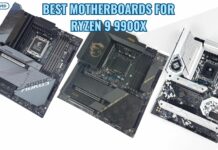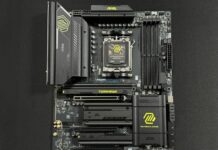Who Is It For?
Review Summary
The ASRock B850 Challenger WiFi White is a good value-for-money option for budget gamers if they want to step into the latest Ryzen CPUs. It comes with a 12+2+1 VRM phase design and an adequate cooling system to keep everything under control. Moreover, the number of USB ports and other connectors on this board is pretty decent as well. Besides those, the synthetic performance is still a let-down, making it a viable option only for gamers.
Hours Tested: 10
Overall
-
Performance - 8/10
8/10
-
Value - 8.5/10
8.5/10
-
Features - 8/10
8/10
-
Design - 9.5/10
9.5/10
Pros
- Acceptable 12+2+1 phase power delivery
- 8000 MT/s DRAM speed support
- Great aesthetics
- Heat sinks for both NVMe drives
- Decent gaming performance
- WiFi 7 & Bluetooth 5.4
- Affordable pricing
Cons
- Limited overclocking capabilities
- Poor synthetic performance
We have tested a lot of B850 motherboards. Now, we’re almost in the Q4 of 2025, and ASRock has just dropped two new motherboards for its Challenger series. One of them is called ASRock B850 Challenger WiFi White, and this is exactly what we’re going to review today.
Key Takeaways
- The ASRock B850 Challenger WiFi is designed for gamers and users with white-themed builds in mind. The board looks great with plenty of ports and performance to make the experience worth it.
- It’s a great choice for gamers with a strict budget in mind, as the gaming performance is favorable on this board.
- It’s better to stay away if you wish to use the PC for synthetic workloads, since the board doesn’t perform that well.
These are the motherboard’s on-paper specifications:
| ASRock B850 Challenger WiFi White | Specifications |
|---|---|
| CPU Support | AMD Ryzen 7000, Ryzen 8000, Ryzen 9000 |
| Memory Support | DDR5 8,000 MT/s |
| PCIe Slots | 1x PCIe 5.0 x16, 1x PCIe 4.0 x16 (x4 mode), 2x PCIe 4.0 x1, 1x M.2 Socket |
| M.2 Slots | 1x Gen 5x4, 1x Gen 4x4 |
| SATA Ports | 4x SATA3 6Gb/s |
| Audio | Realtek ALC897 Audio Codec |
| Network & Connectivity | 1x 2.5G LAN, 1x 802.11be 2x2 WiFi 7, Bluetooth 5.4 |
| USB Ports | 19 USB ports |
| Size | ATX Form Factor: 305mm x 244mm |
| MSRP | $179 |
As evident from the chart, the motherboard offers a total of 19 USB ports as well as two M.2 slots for storage. Moreover, the board also comes with two PCIe slots for a graphics card, with a dedicated four-slot GPU space in between.
Packaging & Unboxing
We get a pretty simple-looking packaging for the ASRock B850 Challenger WiFi White motherboard. It has the motherboard itself printed right along the name of the motherboard. Moreover, there’s nothing extraordinary drawn onto the board except triangle-like shapes in white, blue, and gray colors.
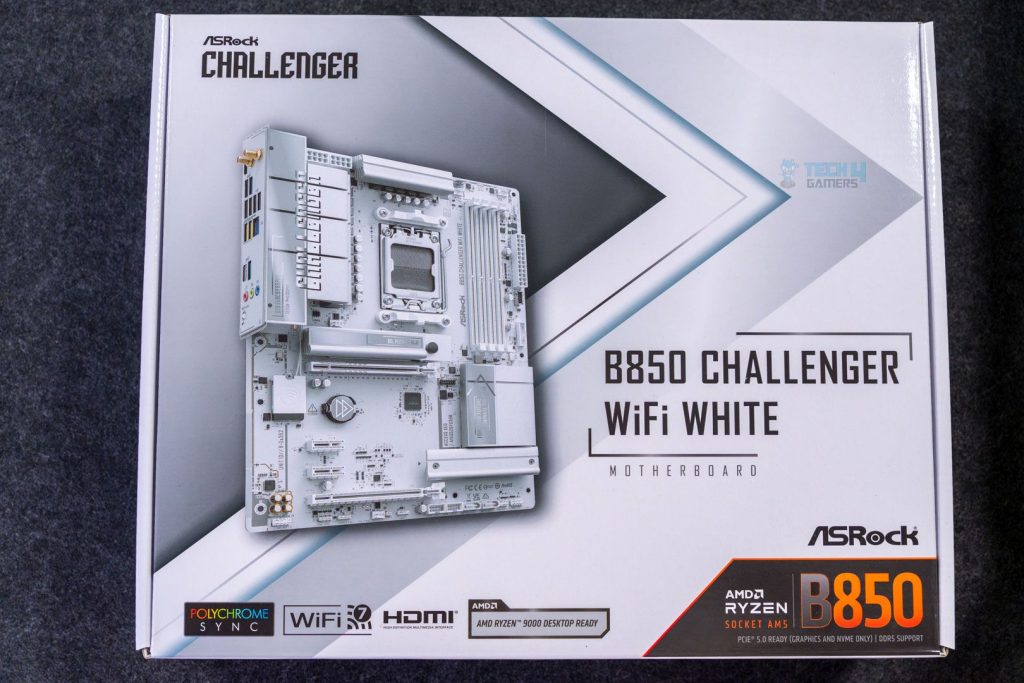
The front side of the box also has a few certified tags on its bottom area, which include ASRock’s very own RGB software “Polychrome Sync”. Other than that, you can see the HDMI, WiFi 7, and AMD Ryzen 9000 Desktop Ready branding as well.
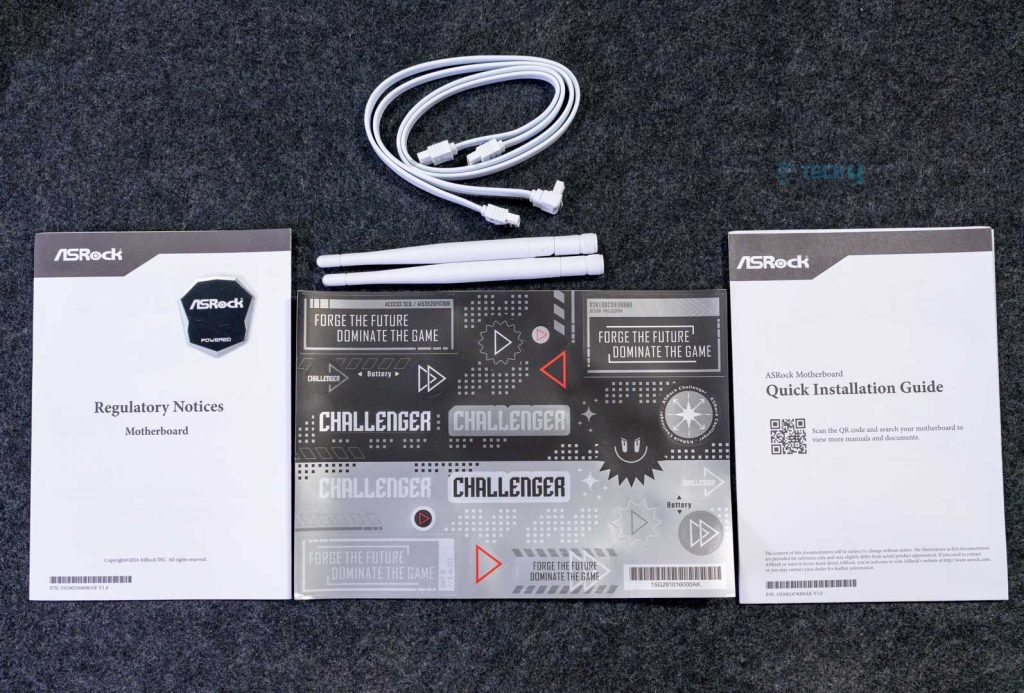
Here’s all the stuff that you get inside the box besides the motherboard:
- 2x SATA Data Cables
- 2x WiFi Antennas
- 1x Sticker Sheet
- 1x ASRock Badge
- 1x Regulatory Notice
- 1x Quick Installation Guide
While there aren’t many accessories bundled with the motherboard, ASRock did, however, include a few extras that serve no functional purpose, but certainly add to the customer experience.
Design
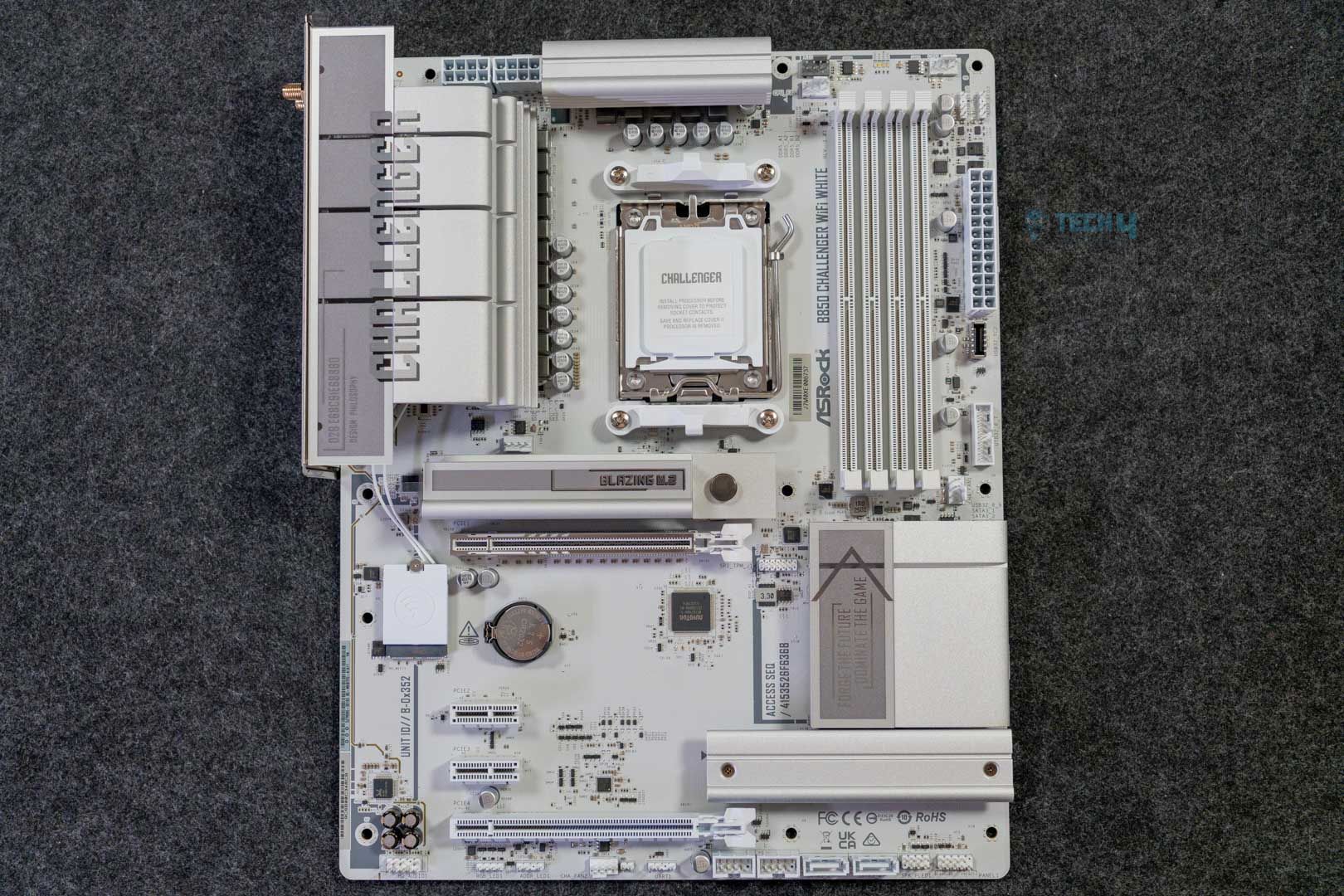
After unwrapping everything, you can see a white-themed motherboard with gray accents in a metallic finish on heat spreaders. The board looks absolutely breathtaking, with the branding of various features and its name over the heatsinks further enhancing its appearance. To be honest, I’d give it a solid 9/10 for the looks.
Moreover, the board is built on the same structure as the other similarly priced motherboards, which is an 8-layer PCB design. It is more than sufficient for mild overclocking without experiencing major instability issues, as voltages would pass through normally. Similarly, the abundance of heat sinks will also ensure that the VRMs don’t go too high in terms of temperature levels during OC tweaking.
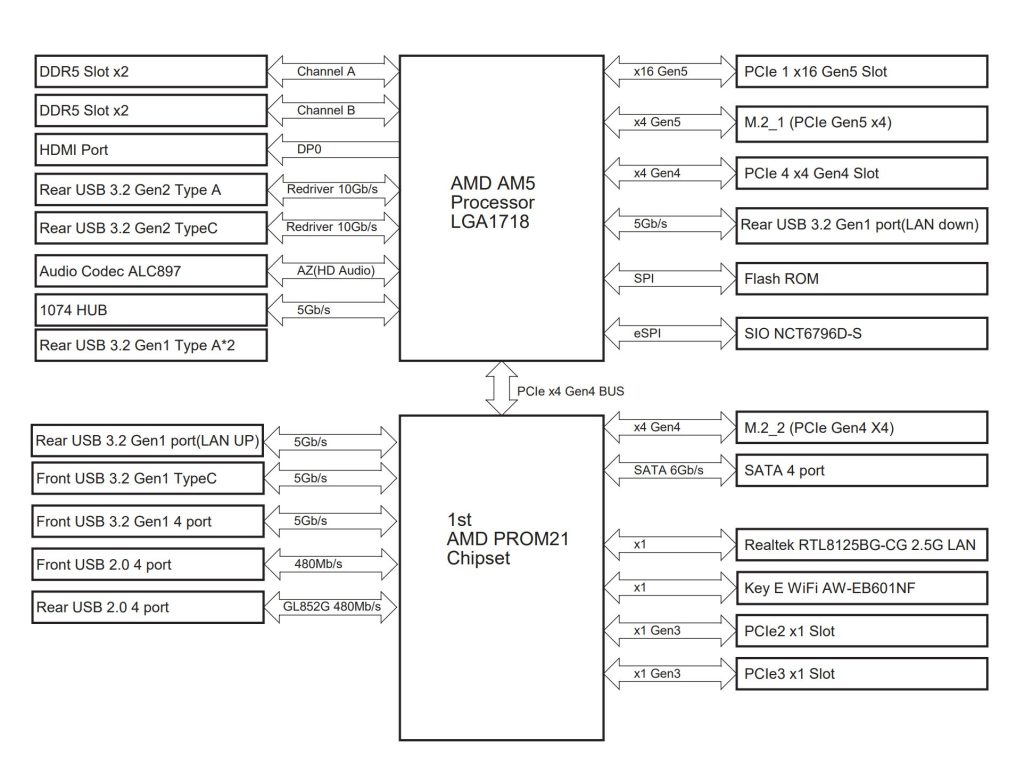
As per the block diagram provided by ASRock, the chipset provides power to the SATA ports, M.2_2 slot, 2.5G Ethernet port, Key E WiFi, PCIe2 & 3 x1 slots, front USB 2.0 & 3.2 Gen1 ports, and rear USB 3.2 Gen1 port. Meanwhile, the CPU powers the PCIe1 x16 Gen5, PCIe4 x4 Gen4 slot, Flash ROM, SIO NCT6796D-S I/O controller, DDR5 RAM slots, HDMI port, audio codec, and the rest of the rear and front USB ports.
Power Delivery System
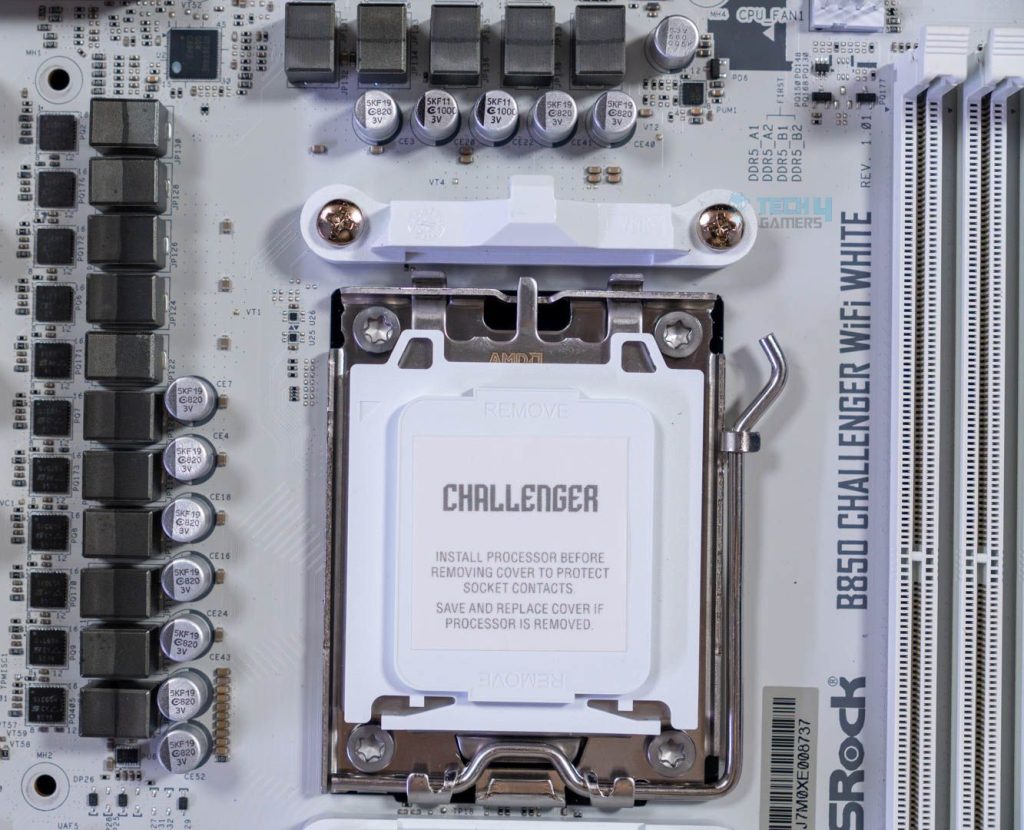
Taking a look at the power delivery on this ASRock B850 Challenger WiFi White reveals that it incorporates a 12+2+1 phase VRM design with Dr.MOS for VCore, SOC, and MISC. So, according to the spec sheet and our testing, this power delivery system is enough to let you overclock almost any AMD processor to a certain level. Don’t expect extreme overclocking, though, as it can only do so much being an entry-level board.
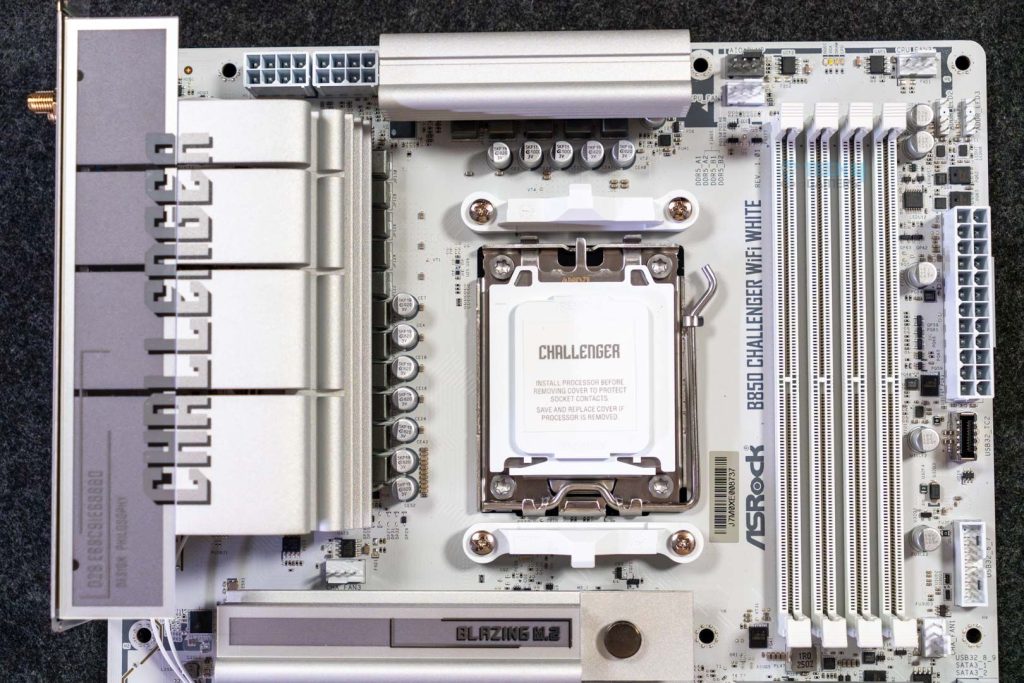
Unlike the ASRock B850 LiveMixer WiFi, which has an 8+4-pin CPU connector design. This board has 2x 8-pin 12V connectors that come with ASRock’s Hi-Density Power design to help them withstand higher-than-usual voltages during overclocking without any issue.
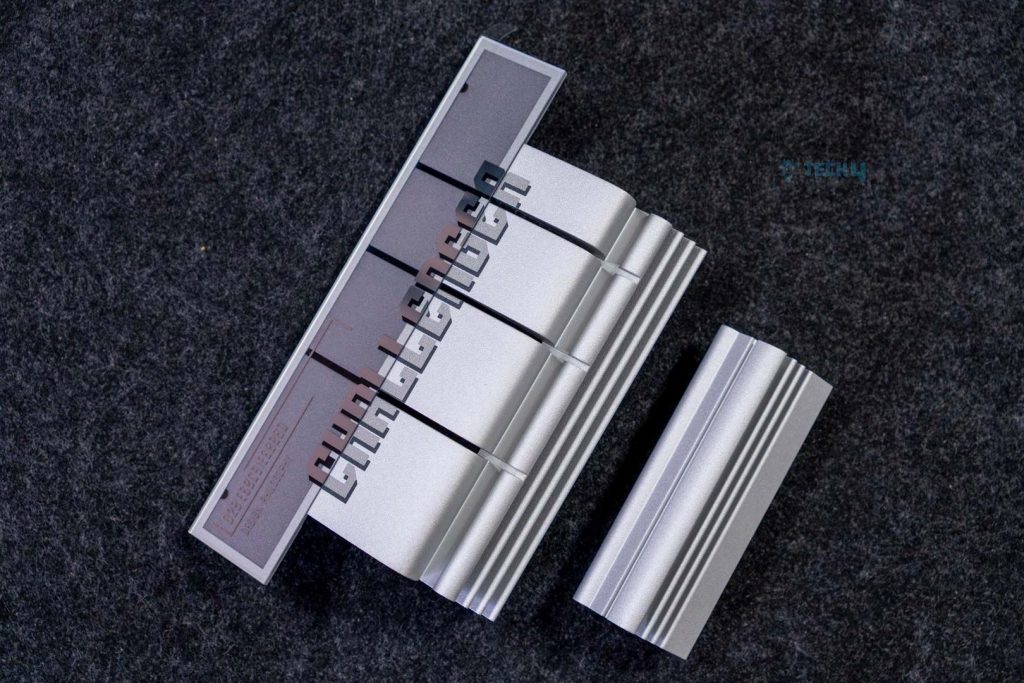
The heatsink features the vertically stacked fin design that serves its purpose of cooling down the VRMs quite well. The main heatsink also has the “Challenger series” branding on top of it. However, there’s no heat pipe in sight to connect both heatsinks and further improve the cooling capabilities.
DIMM Slots
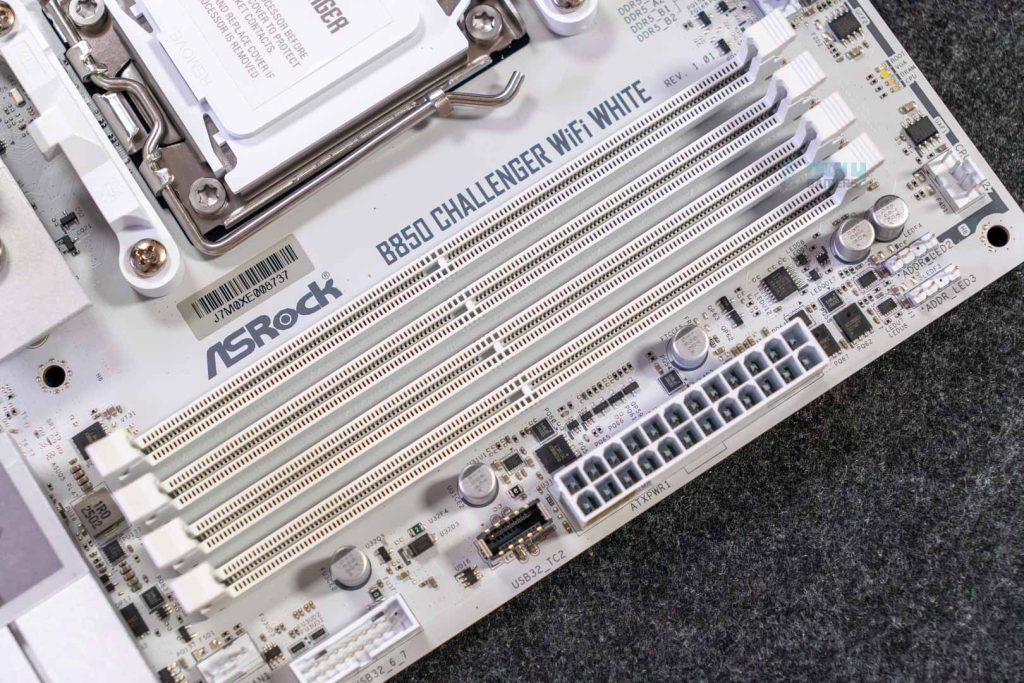
The motherboard offers four DDR5 DIMM slots same as other ATX boards, and can support up to 256 GB of memory running at 8000 MT/s. Moreover, support for both Intel XMP and AMD EXPO is available to use pretty much any DDR5 memory on the market.
PCIe Slots
We get two PCIe x16 slots on this motherboard, where the PCIe1 is Gen5 in x16 mode, while the PCIe4 is Gen4 in x4 mode. The PCIe1 slot has four-slot GPU space, so you can install even the beefiest graphics card models. Moreover, the PCIe1 slot also has an EZ latch system in place, as well as the reinforced steel standard for better reliability.
Other than these, there are two more PCIe x1 slots with open ends, meaning that you can install any full-sized x16 expansion card if it can perform decently on PCIe 4.0 x1 mode.
Storage
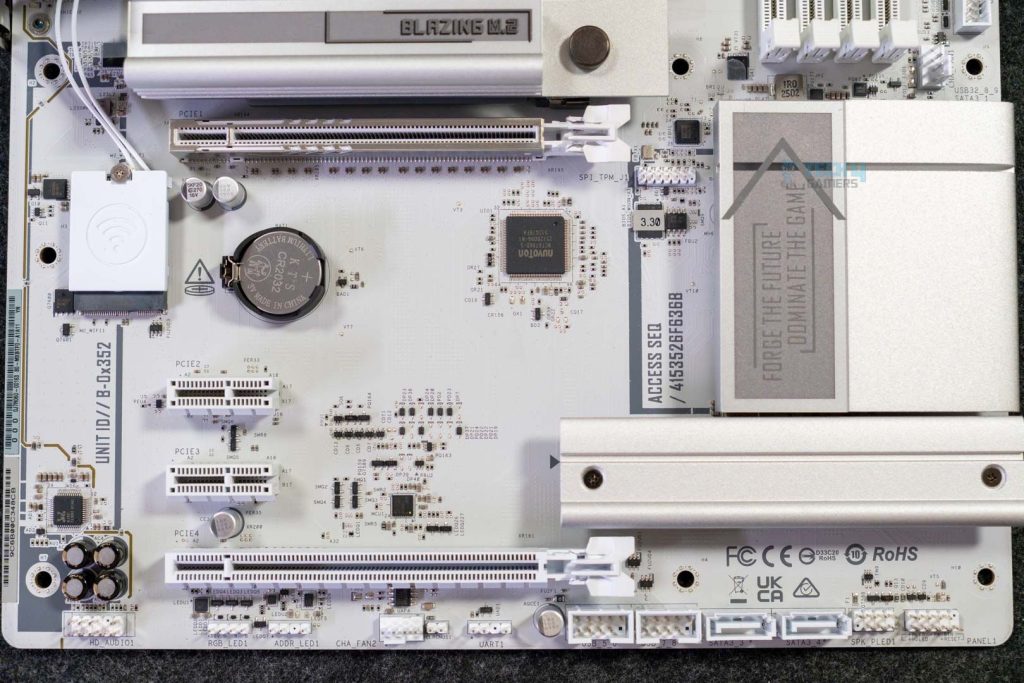
As far as the storage side is concerned, the motherboard comes with two M.2 slots, where the M.2_1 is PCIe Gen5x4, while the M.2_2 is PCIe Gen4x4. Both of these M.2 slots have heatsinks with thermal pads to dissipate the heat, so that’s great to see here. Another thing that’s worth mentioning is that the M.2_1 slot has thermals on both sides, while the M.2_2 has one. Here’s an image of heatsinks removed so you can take a look at the double-sided thermal pads of the M.2_1 slot.
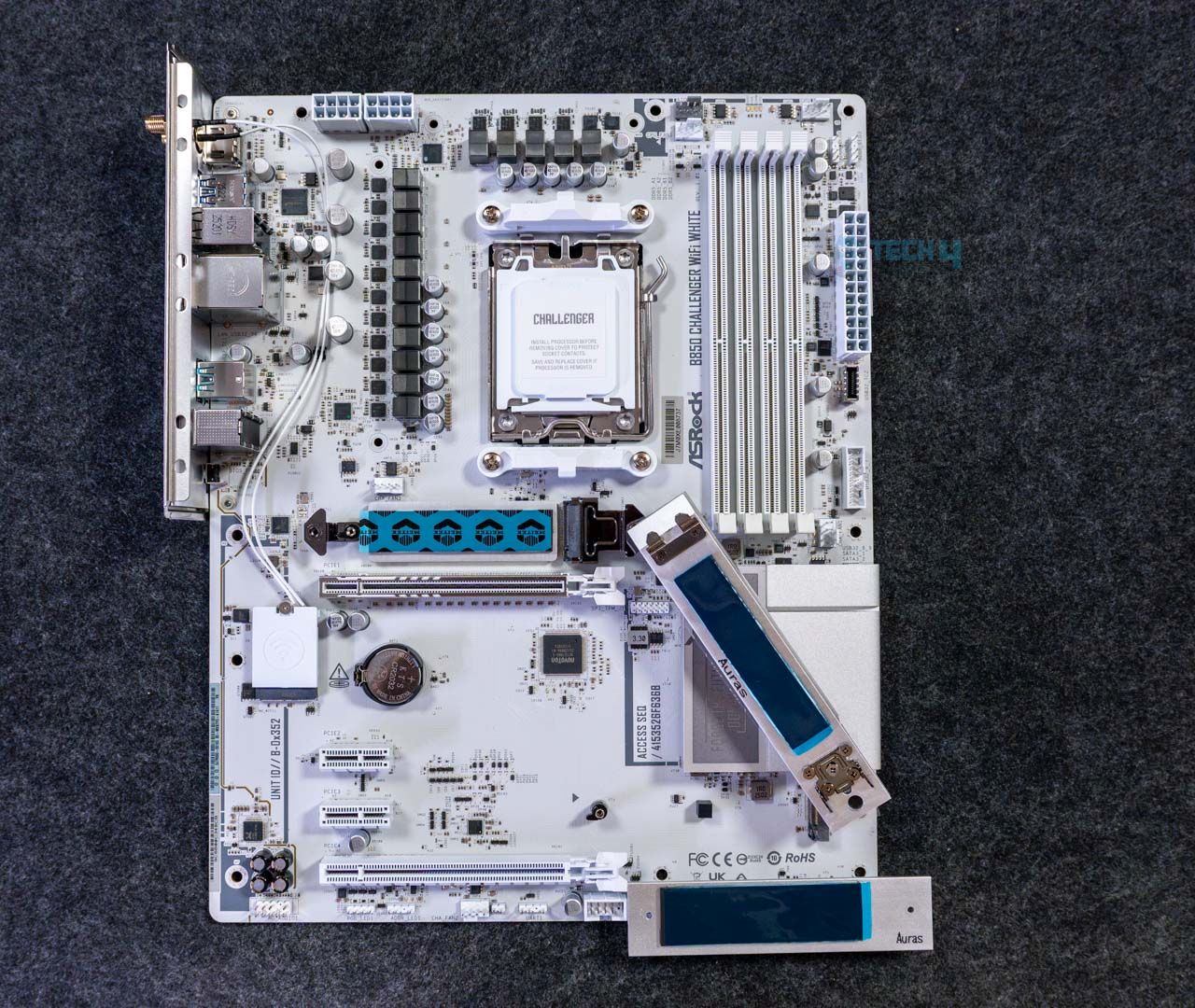
Besides the M.2 drives, there are 4x SATA3 6 Gb/s connectors as well. Two at the bottom and two under the chipset heatsink. Not to forget, the M.2_1 will be limited to Gen4x4 speeds if you decide to use any Ryzen 8000 series processor.
USB Connectivity
The ASRock B850 Challenger WiFi White motherboards come with a total of 19 USB ports:
- 1x USB 3.2 Gen2 Type-C (Rear)
- 1x USB 3.2 Gen2 Type-A (Rear)
- 4x USB 3.2 Gen1 Type-A (Rear)
- 4x USB 2.0 (Rear)
- 4x USB 3.2 Gen1 Type-A (Front)
- 1x USB 3.2 Gen1 Type-C (Front)
- 4x USB 2.0 (Front)
All the USB ports come with ESD protection, so none of the connected devices receive any damage due to a sudden flow of power. Though, it would have been great if any of the Type-C ports had PD charging support.
Network & Connectivity
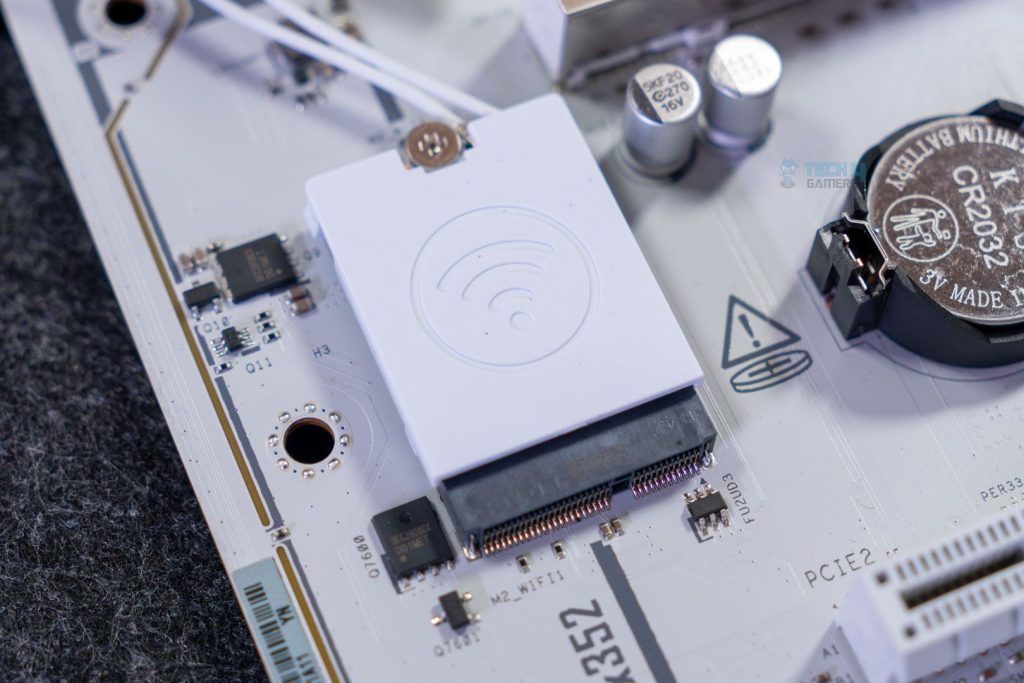
The motherboard doesn’t have any 5G LAN port; however, it does have the standard 2.5G LAN, which is fine enough. Nevertheless, the board does have a WiFi 7 & Bluetooth 5.4 module installed, which is great, and the addition of the MLO (Multi-link Operation) feature is even better. Simply because it helps in reducing the latency with the use of multiple bands and channels. Also, the module is installed right where you can see it and has no cover or anything, so you can easily swap it for an upgrade later on if needed.
Audio Solution
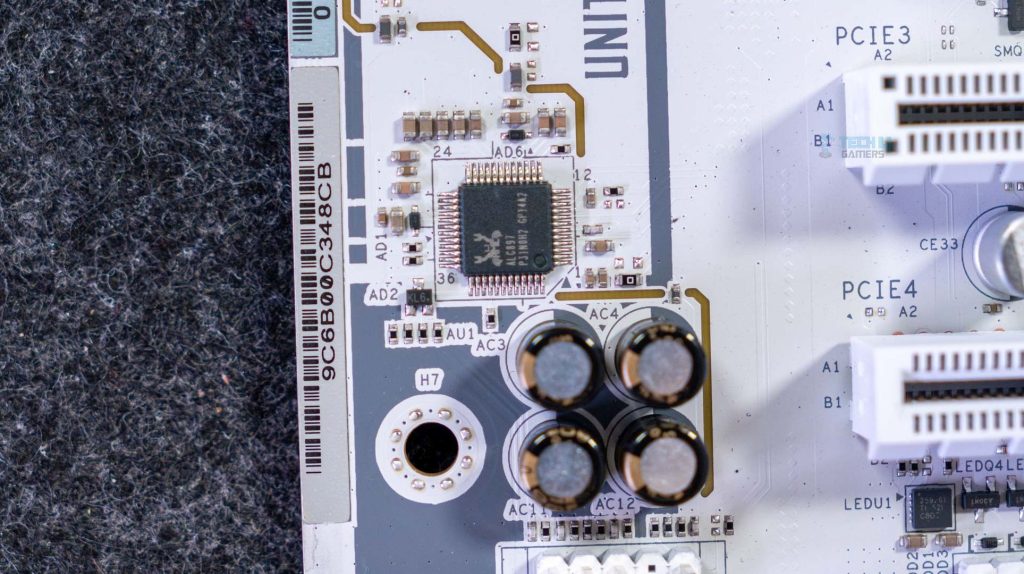
The ASRock B850 Challenger WiFi White boasts the Realtek ALC897 audio codec with Nahimic enhancements on top. This specific audio codec is common in entry-level and mid-range motherboards and serves its purpose quite well if you’re a casual user or gamer. The codec doesn’t have any DAC features in it, so professional-level stuff won’t be possible.
Internal Connectors
I’ve listed all the connectors that you can find on this ASRock B850 Challenger WiFi White below:
- 1x SPI TPM Header
- 1x Power LED and Speaker Header
- 1x RGB LED Header
- 3x Addressable LED Headers
- 2x CPU Fan Connectors (4-pin) (Smart Fan Speed Control)
- 3x Chassis Fan Connectors (4-pin) (Smart Fan Speed Control)
- 1x AIO Pump Fan Connector (4-pin) (Smart Fan Speed Control)
- 1x 24-pin ATX Power Connector
- 2x 8-pin 12V Power Connectors (Hi-Density Power Connector)
- 1x Front Panel Audio Connector
- 2x USB 2.0 Headers (Support 4 USB 2.0 ports)
- 2x USB 3.2 Gen1 Headers (Support 4 USB 3.2 Gen1 ports)
- 1x Front Panel Type C USB 3.2 Gen1 Header
The motherboard has support for up to three addressable RGB strips and can provide up to 15W of power. Besides that, you can obviously see the 24-pin motherboard power connector, and right with that, there’s the USB 3.2 Type-C header. Similar to the 8+8-pin 12V connectors, the 24-pin ATX connector also features the ASRock Hi-Density Power design.
Additionally, the board does have a Post Status Checker that proves to be useful while troubleshooting your way through, in case you encounter any problem. The PSC includes four distinctive small LEDs with different colors that, if they stay solid, mean there’s an issue with that specific component. Like, the solid red is for CPU, solid white for GPU, solid yellow-green for boot drives, and solid yellow for DRAM.
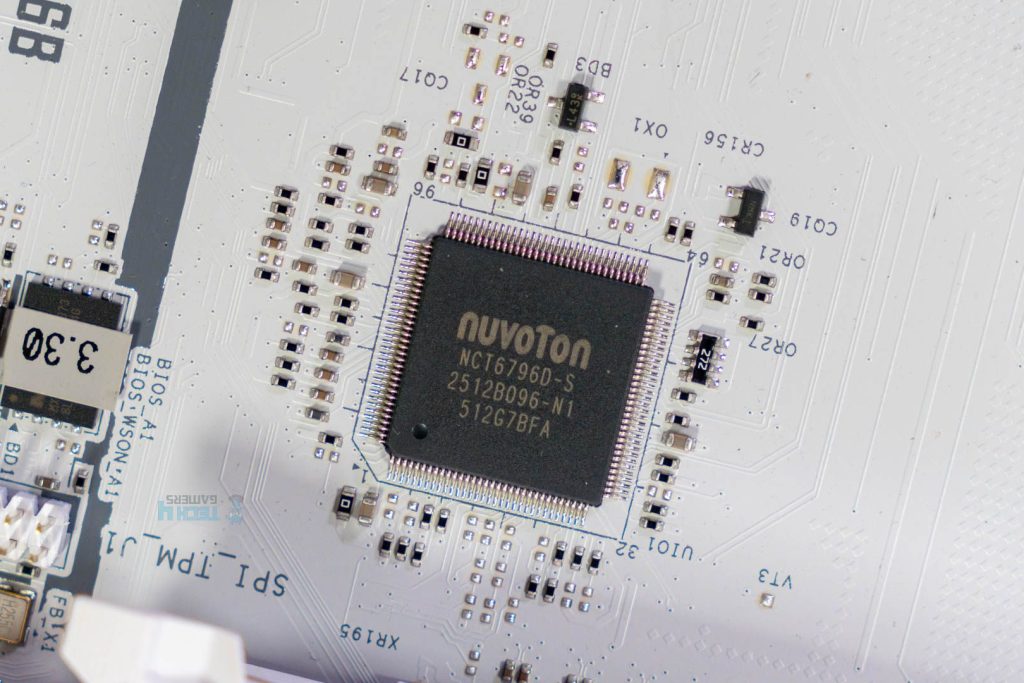
With so many connectors and headers all over the motherboard, it requires an equally capable I/O controller to handle everything swiftly. So for that, the Nuvoton NCT6796D-S I/O is in place here, which controls and monitors everything just fine.
Rear I/O Panel
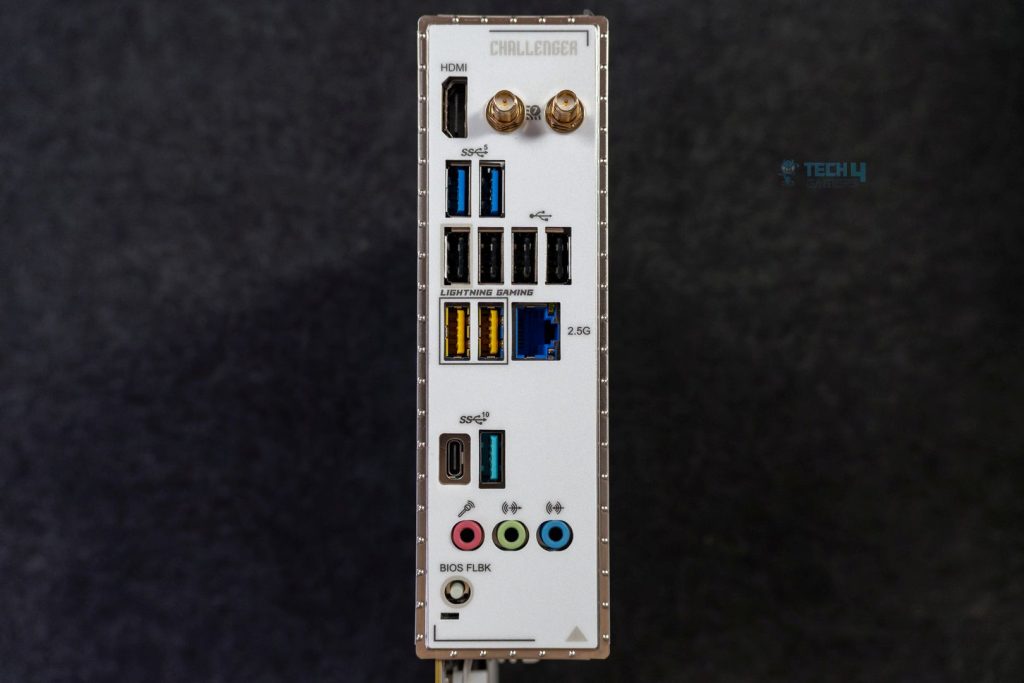
- 2x Antenna Ports
- 1x HDMI Port
- 1x USB 3.2 Gen2 Type-A Port (10 Gb/s)
- 1x USB 3.2 Gen2 Type-C Port (10 Gb/s)
- 4x USB 3.2 Gen1 Ports
- 4x USB 2.0 Ports
- 1x 2.5G LAN Port
- 1x BIOS Flashback Button
- HD Audio Jacks: Line in / Front Speaker / Microphone
The rear I/O on this isn’t too flashy, but it has all the required ports. Features include a USB 3.2 Gen2 Type-C port, two USB 3.2 Gen1 Type-A ports, and a USB 3.2 Gen2 Type-A port. Moreover, there’s also a BIOS flashback button located near the audio jacks, which can be used to update the BIOS using only a USB drive containing the latest BIOS files.
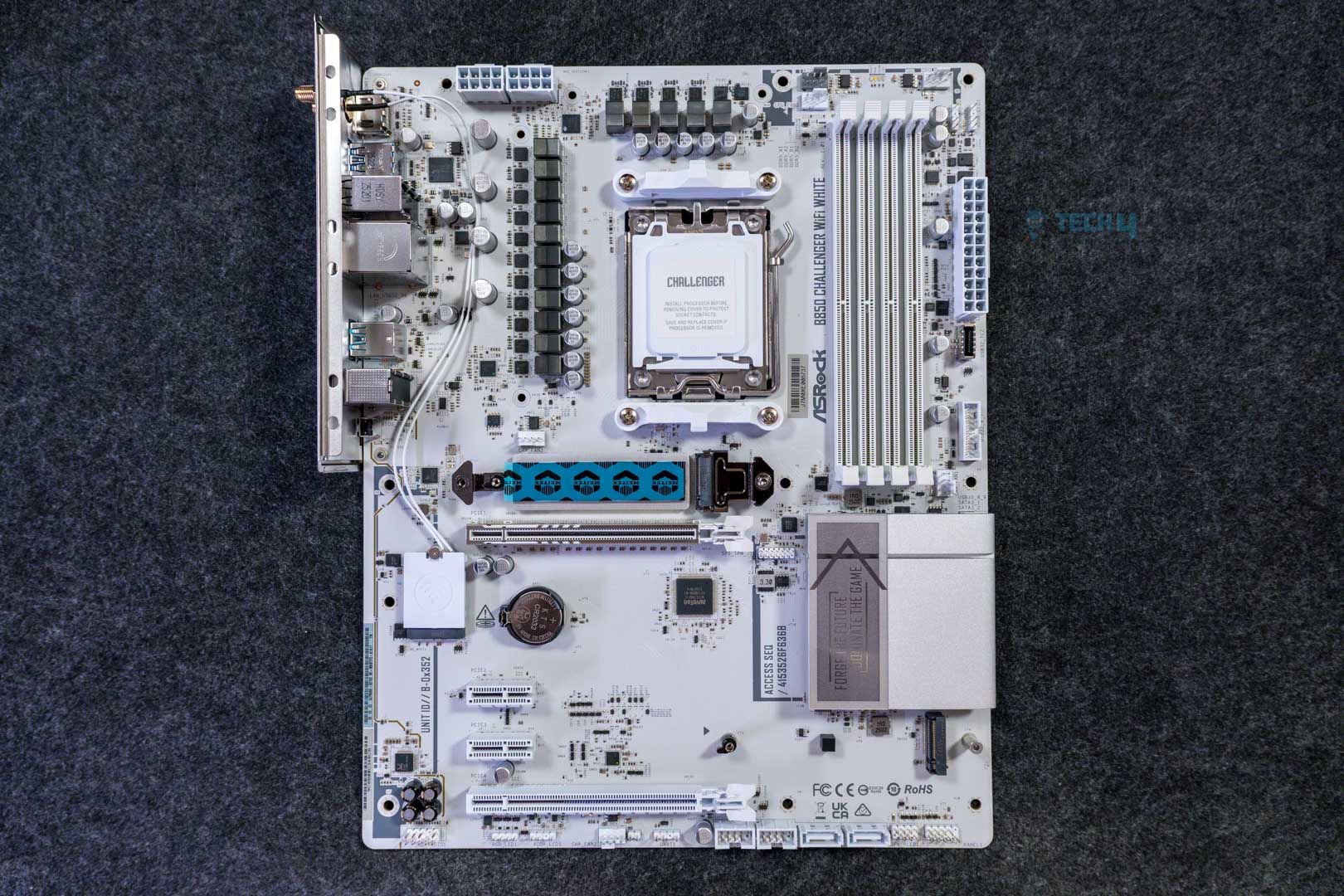
Here’s a quick and last look at the motherboard before we move forward to benchmarking without all the covers that keep the motherboard aesthetically pleasing and cool.
Test Bench
Here’s the test bench I used to test the motherboard on:
- AMD Ryzen 9 9950X 16C/32T
- ARCTIC Liquid Freezer II 420 Liquid CPU Cooler
- G. Skill Trident Z5 Royal NEO DDR5-8000 CL36 EXPO Kit (2×16 = 32GB)
- XPG Lancer RGB 32GB 7200MHz DDR5 RAM
- Nvidia GeForce Gigabyte RTX 4090 Gaming OC
- Western Digital SN850 Black 500GB NVMe SSD [For OS]
- Sabrent Rocket 4 Plus 2TB Gen4x4 NVMe SSD [For Software]
- Sabrent Rocket 4 Plus 4TB Gen4x4 NVMe SSD [For Games]
- Sabrent Rocket NANO V2 4TB Portable SSD
- Corsair HX1200i Platinum PSU
- Windows 11 Pro Build 23H2
Synthetic Benchmarks
Let’s start with synthetic benchmarks and see how the motherboard stacks up:
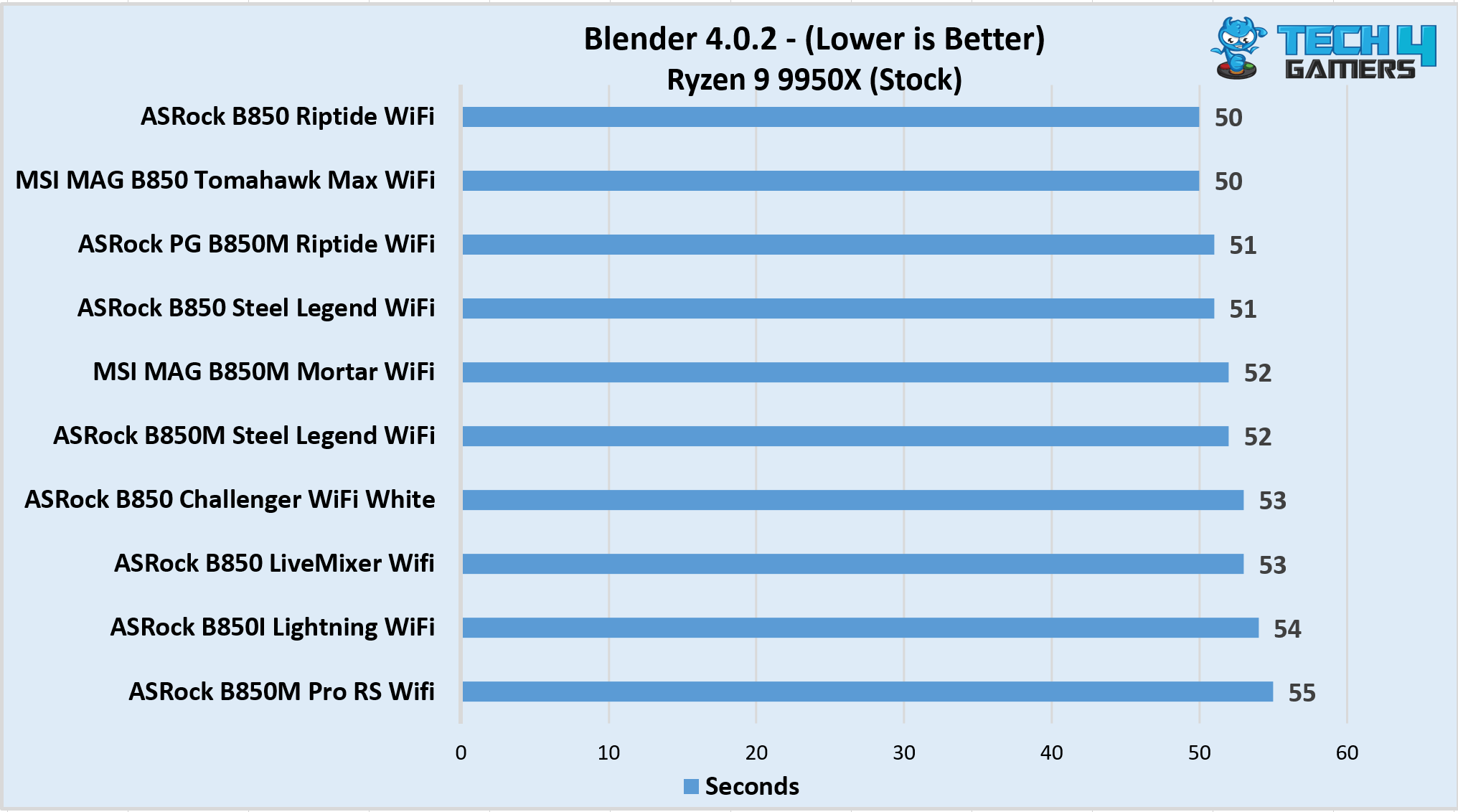
The ASRock B850 Challenger WiFi White takes about 53 seconds to complete a Blender run. The result is the same as the ASRock B850 LiveMixer WiFi, which is better than the ASRock B850I Lightning WiFi and ASRock B850M Pro RS WiFi.
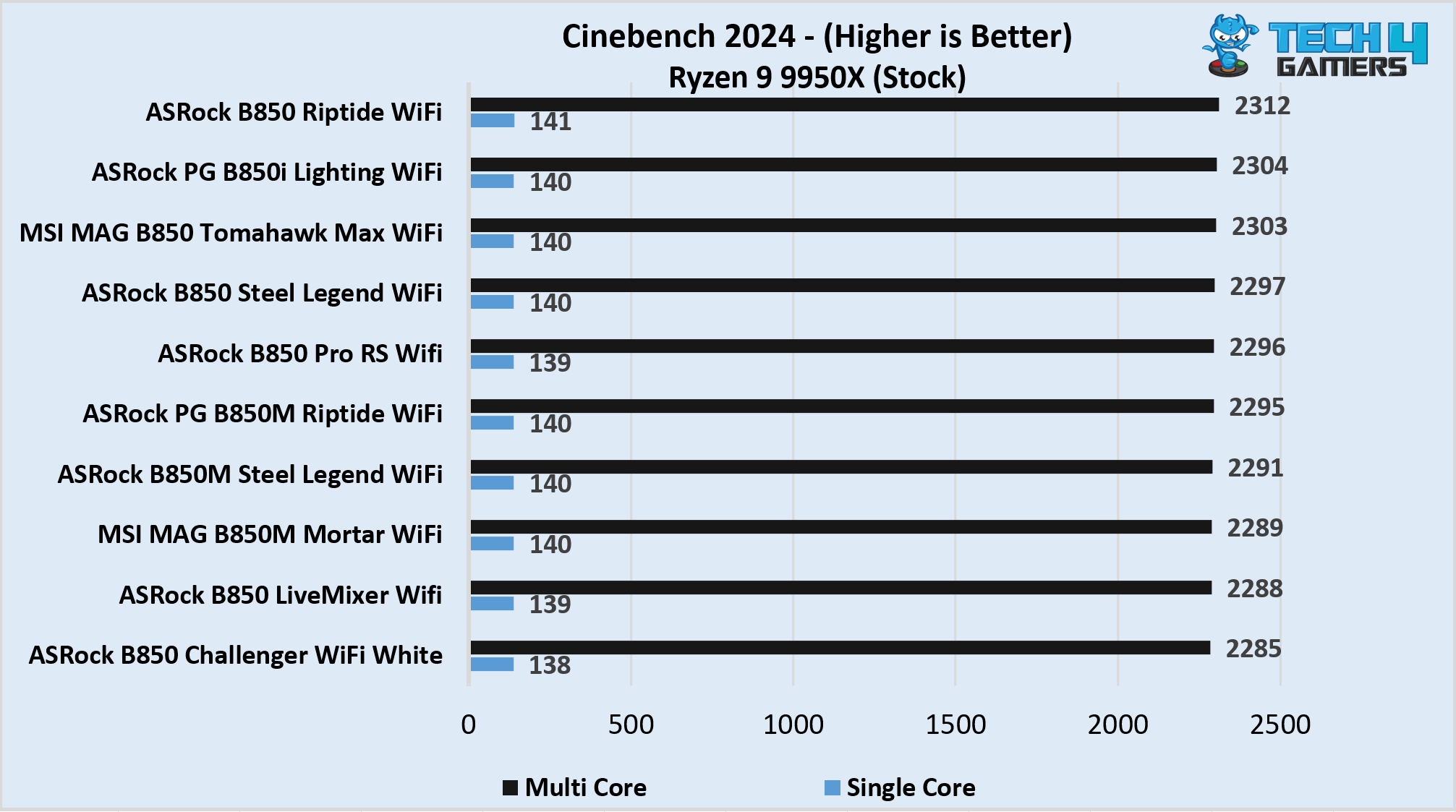
During the Cinebench 2024 run, the result wasn’t that impressive as the board fell behind all other competitors. Although that doesn’t mean the difference is huge, however, it’s worth mentioning. As for actual numbers, it managed 138 scores on single-core and 2285 in multicore, right behind the LiveMixer model by 3 scores.
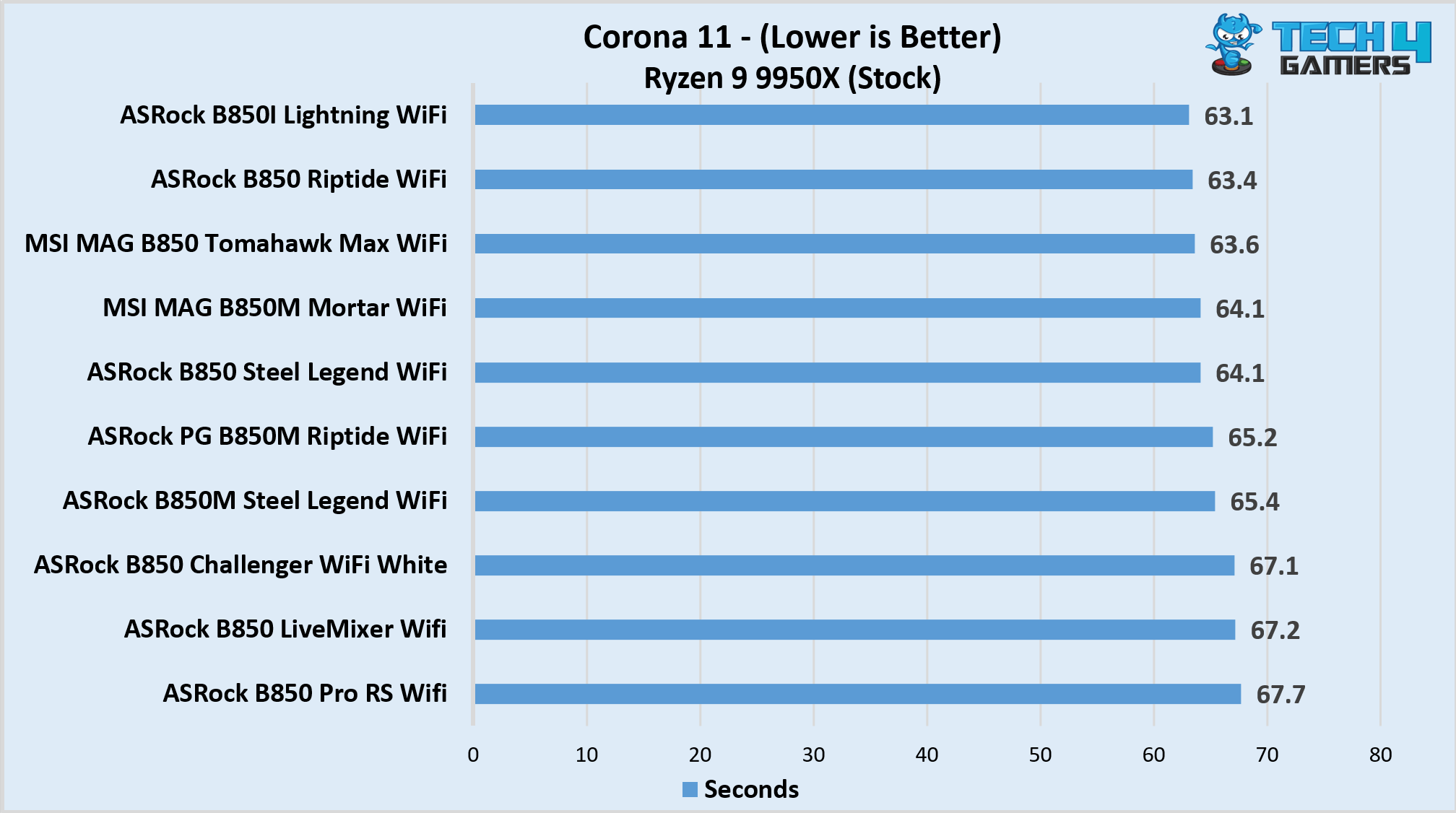
The Corona render test isn’t that great either, but it’s surely better than Cinebench, as the ASRock B850 Challenger WiFi White is performing better than LiveMixer and Pro RS WiFi by a small margin of 0.1 and 0.6 seconds.
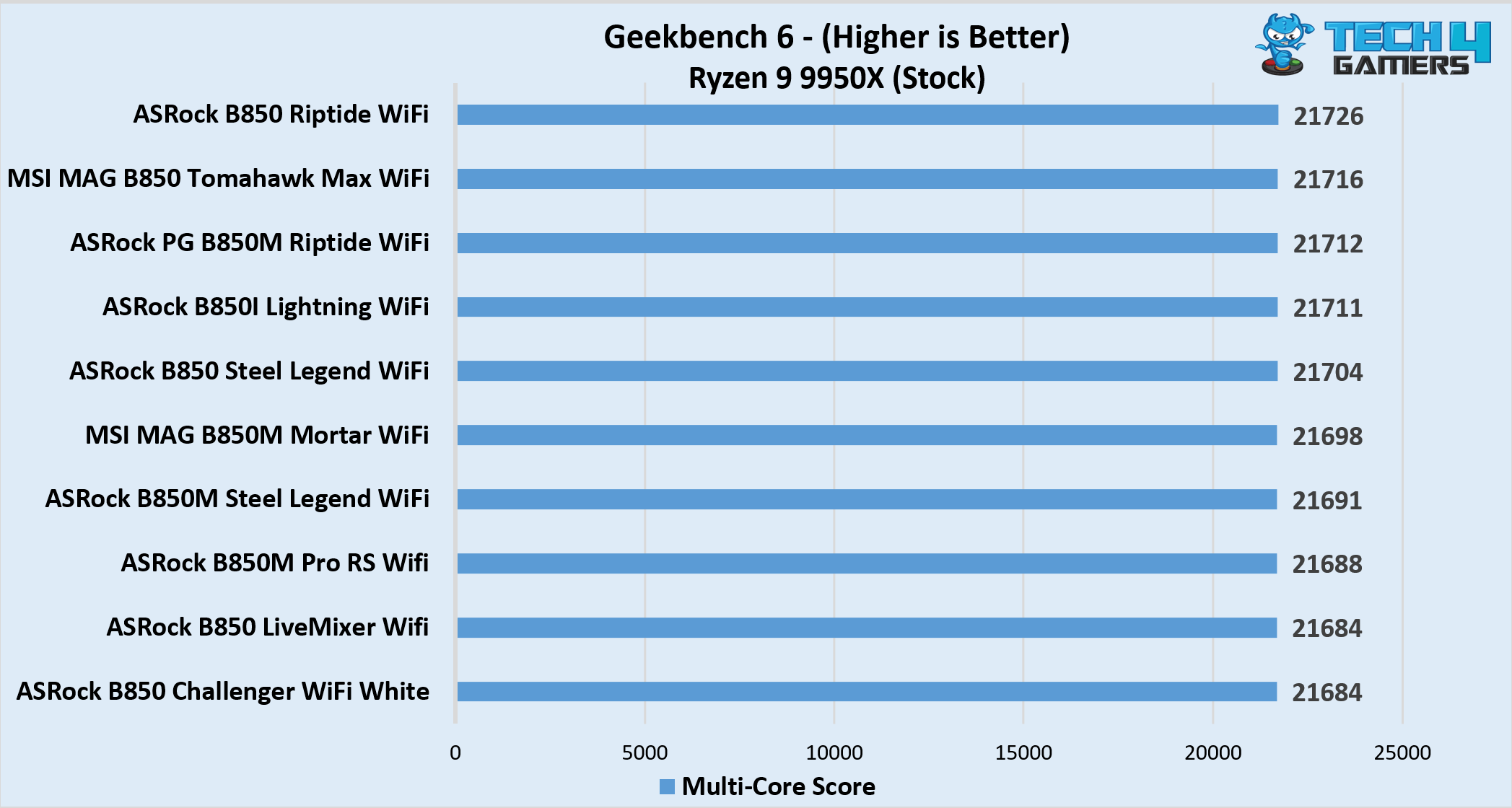
This time around, the motherboard is going head-to-head with the ASRock B850 LiveMixer WiFi as both scored 21,684 points. However, it’s not anything great as they both are still at the end of the result list of Geekbench 6.
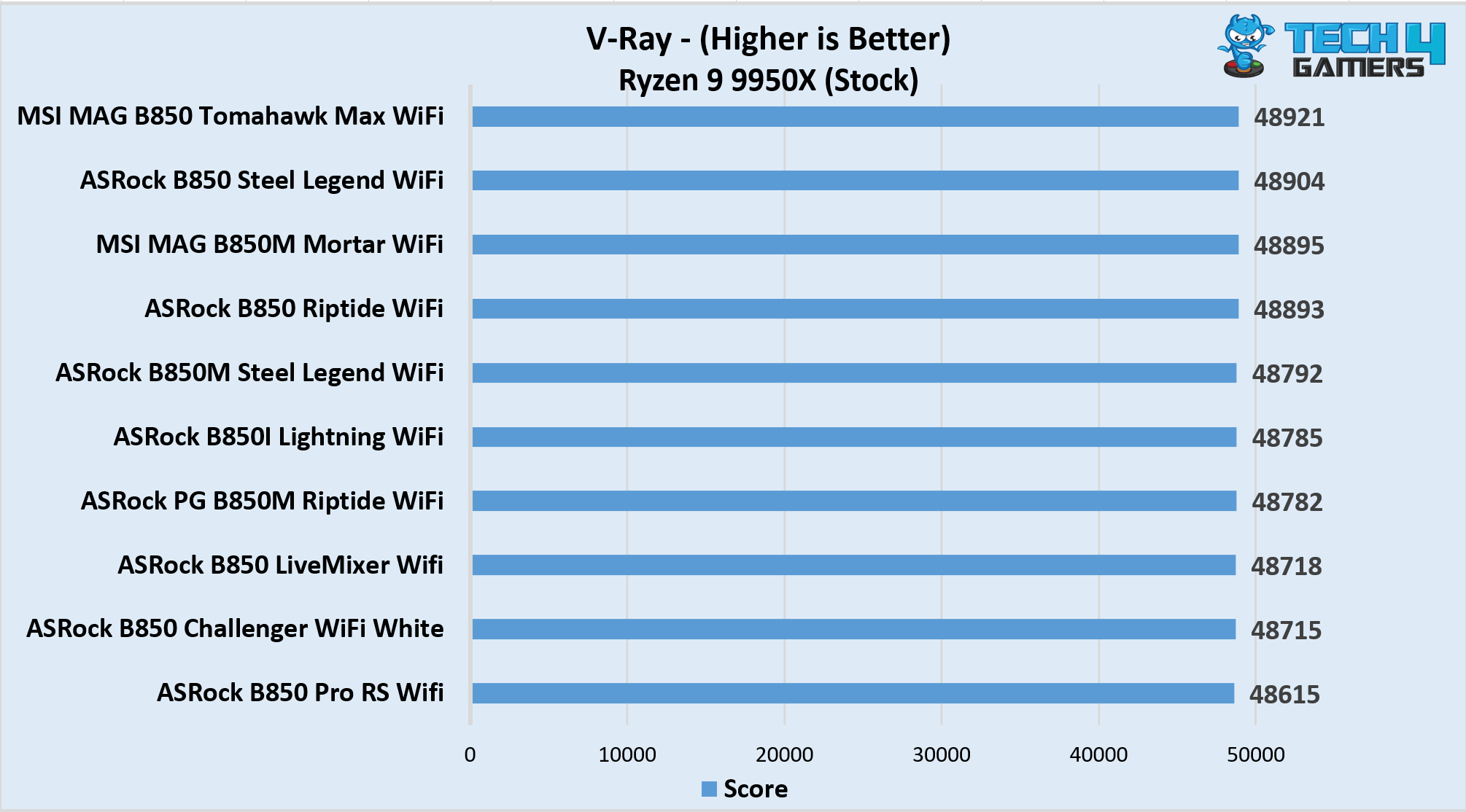
The board was able to save itself from being last in the last one again, as it scored 48,715 points in the V-Ray benchmark. The overall result isn’t too impressive when it comes to synthetic benchmarks, but then again, they’re not too terrible either.
Gaming Benchmarks
Now is the time to see how the motherboard fares in the gaming benchmarks against the other boards:
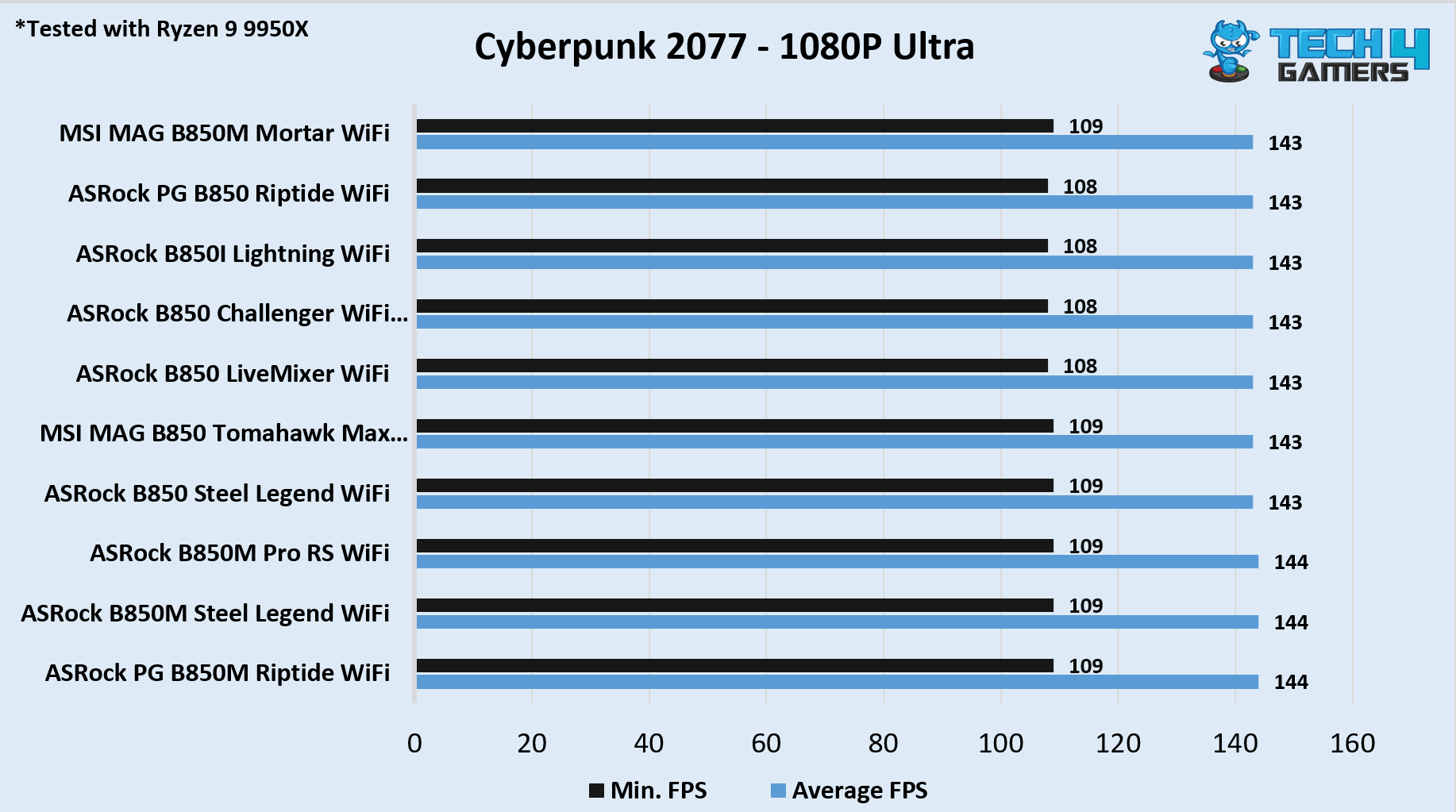
We’re off to a great start here as the motherboard performs similarly to the majority of other boards, with 108 minimum and 143 average FPS.
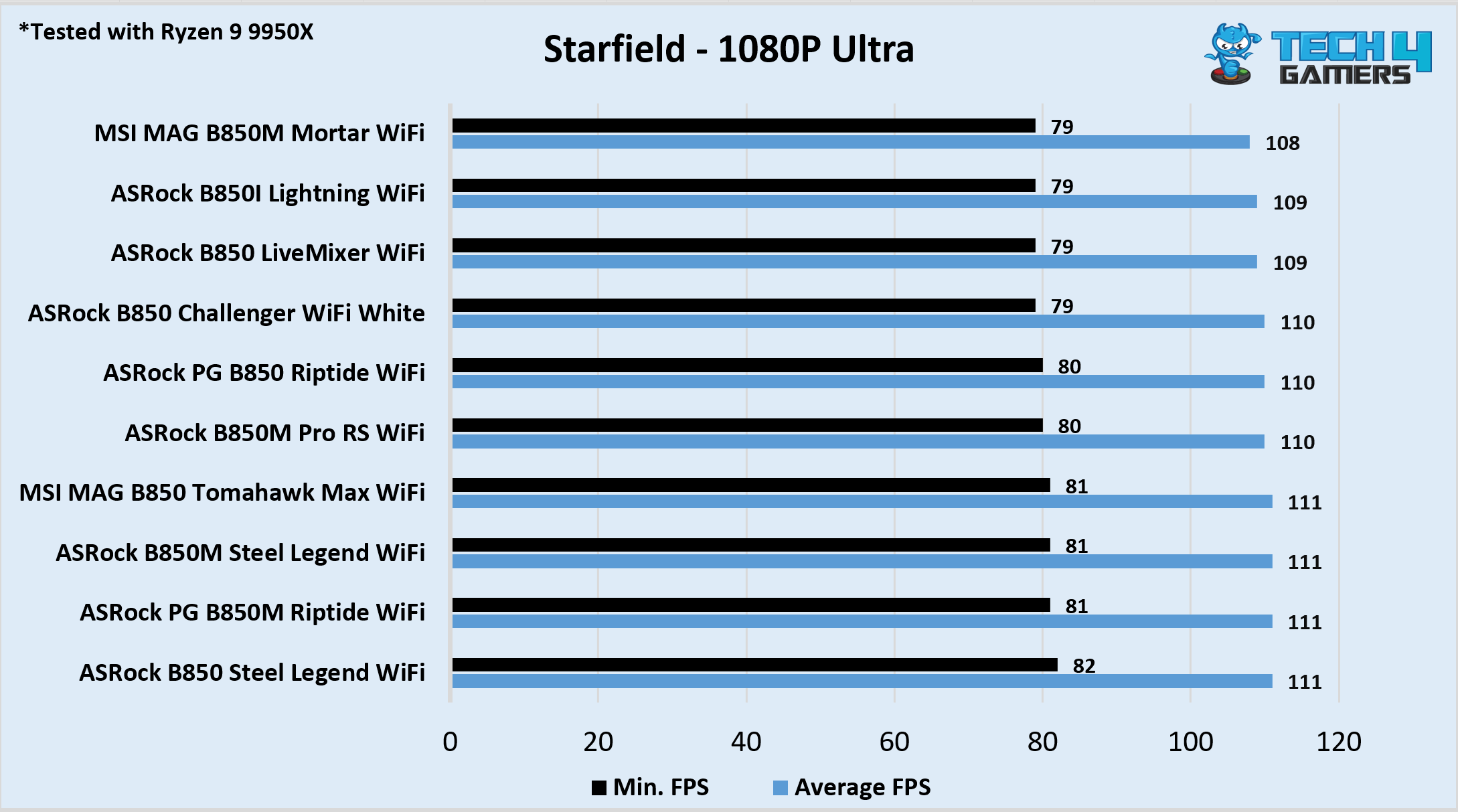
The story is slightly different when it comes to Starfield, as here we saw the ASRock B850 Challenger WiFi White to actually perform better than many of the boards, with 79 as the minimum and 110 as the average FPS.
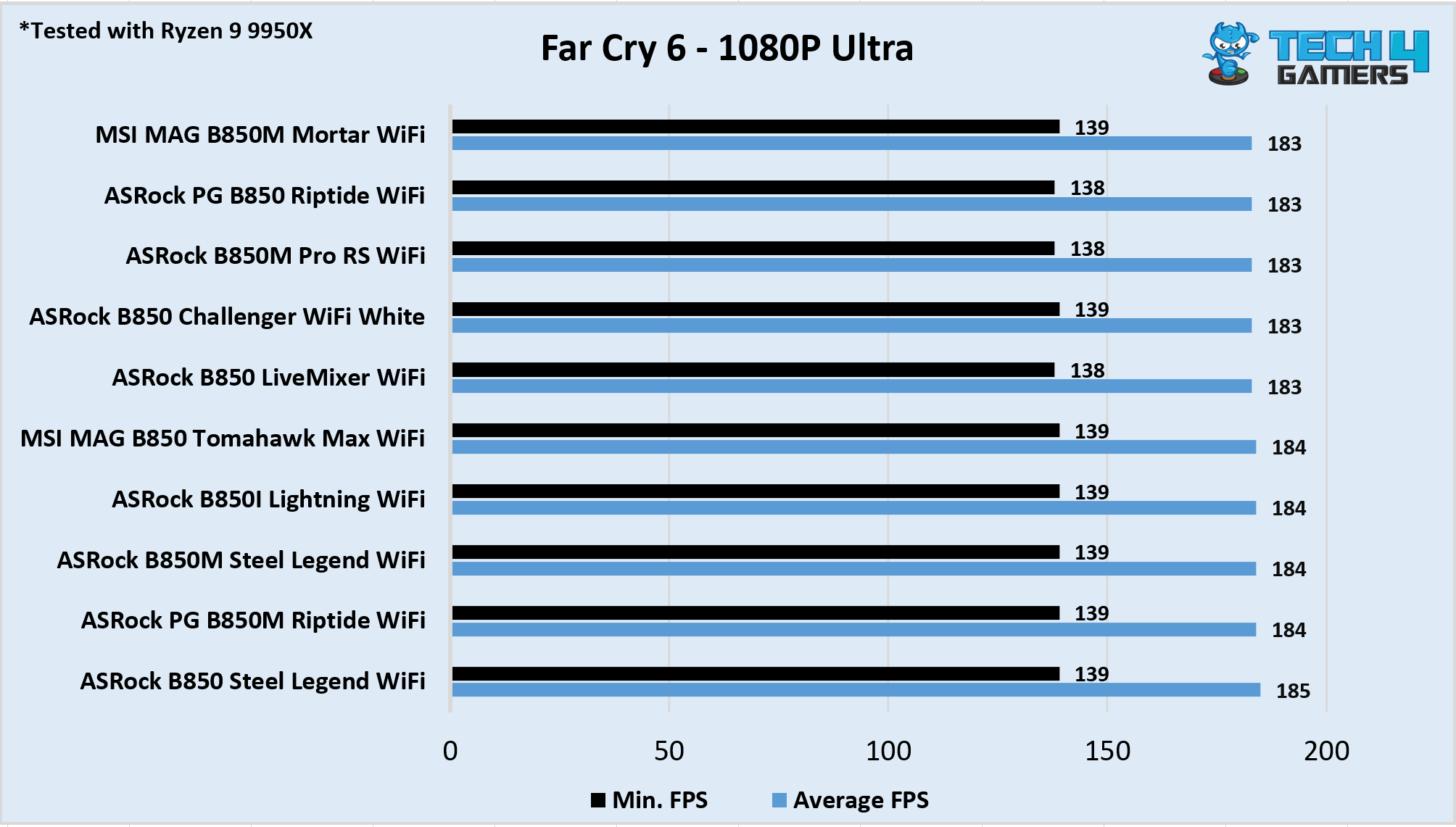
Lastly, we picked Far Cry 6 to test out the motherboards. Here, the story is pretty much the same as it performed the same as almost every other board except for only one. The ASRock B850 Challenger WiFi White and many other boards did 139 as a minimum and 183 as an average FPS.
So, in conclusion, the gaming results are pretty solid on this motherboard, whether it’s the 0.1% lows or average frames.
Power Consumption And VRM Temperatures
We collected these power consumption and temperature results after stressing out the system using Cinebench 2024:
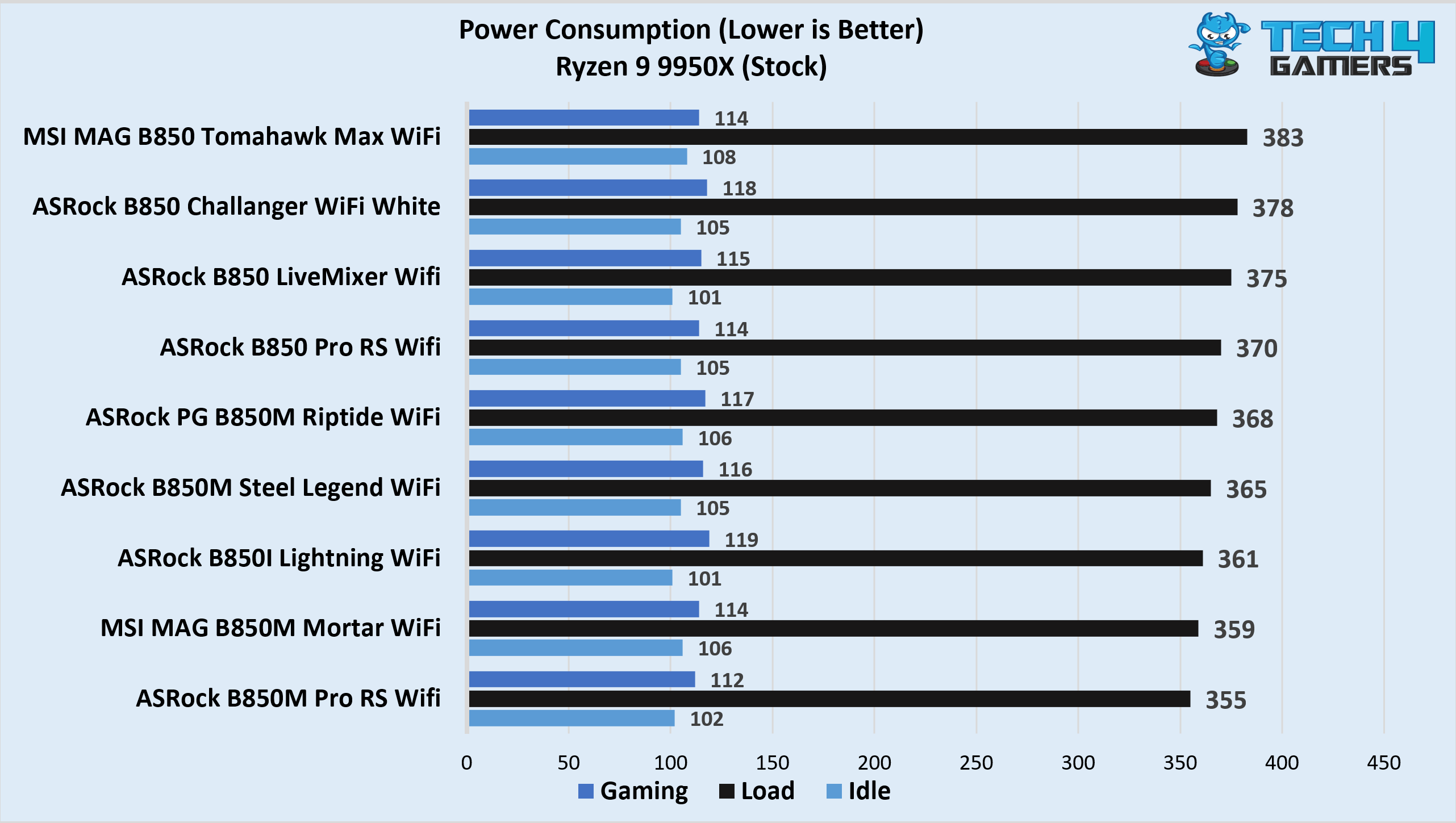
The motherboard has one of the highest power consumptions when it comes to the 100% load, where it’s consuming 378W. Whereas, it idles out at 105W and consumes around 118W while gaming.
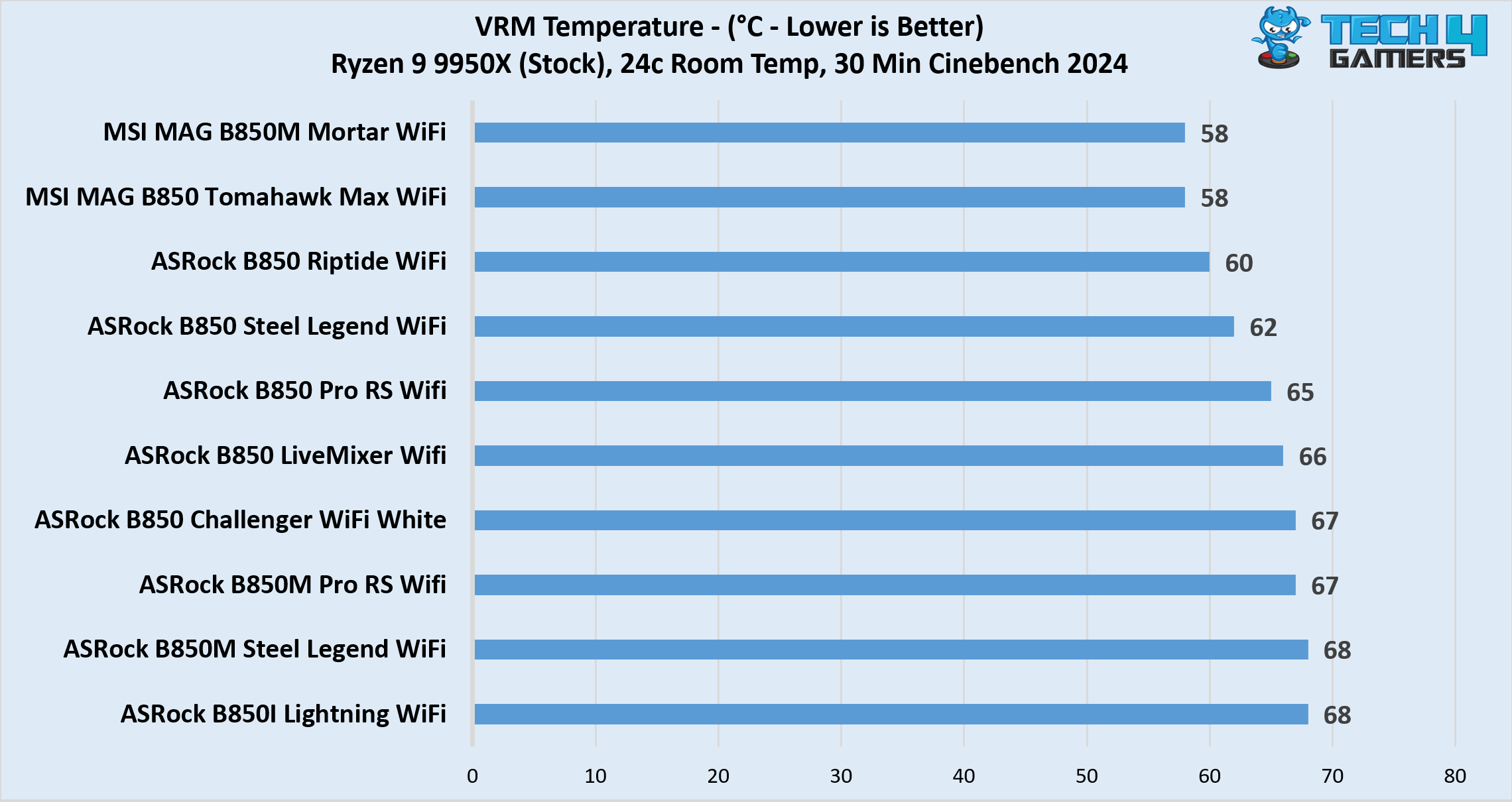
The board runs slightly on the warmer side as the VRM temperatures were recorded at 67°C, which isn’t too bad for an entry-level board.
Boot Times
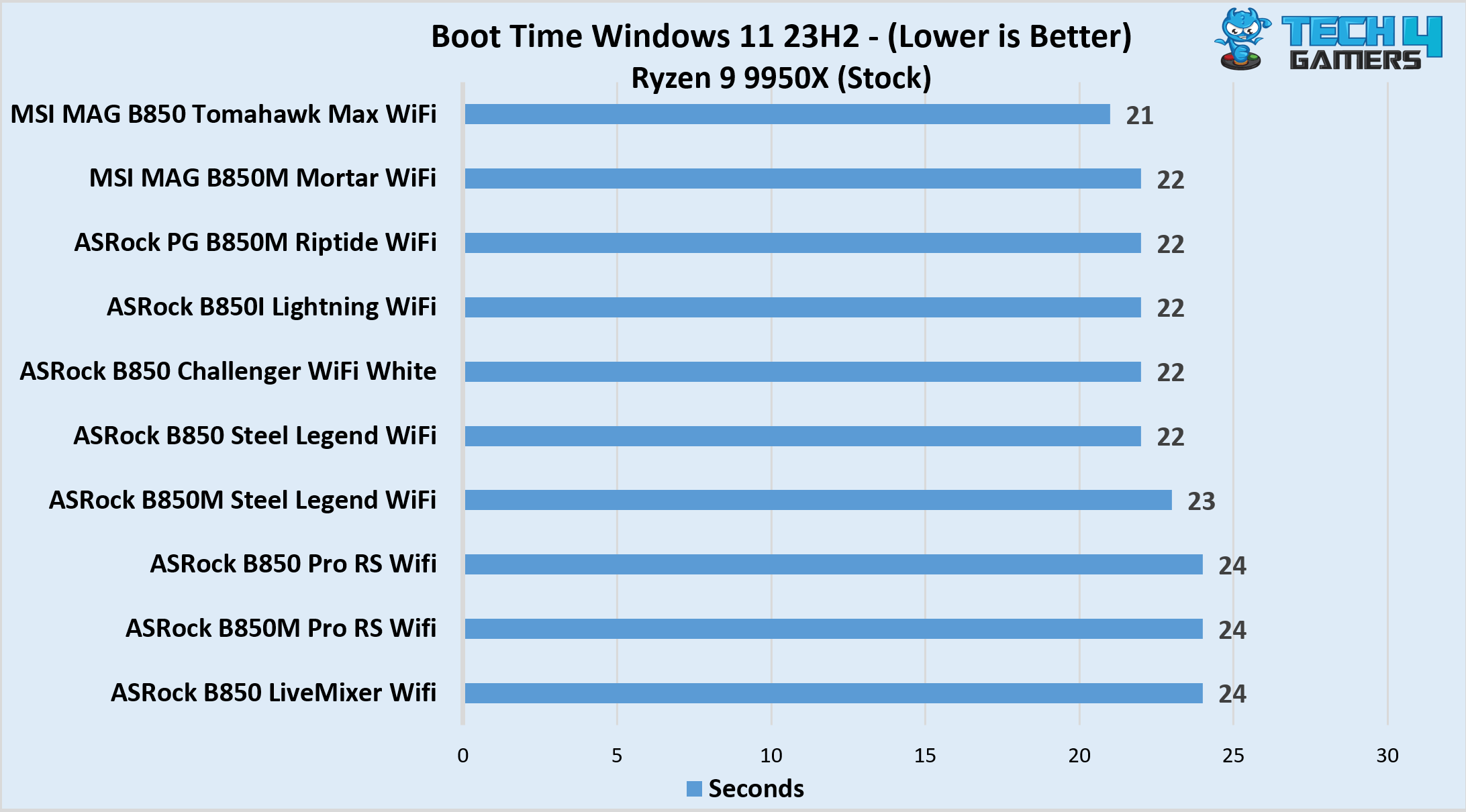
The boot times are also not terrible and certainly not last in the result sheet. With the 22-second boot time, it places itself among the majority of other boards.
Should You Buy It?
Here’s how you can decide whether this board is for you or not:
Buy It If
✅ You need an affordable white motherboard: If you’re building a white-themed PC, and also don’t have the budget to pay the premium to just get a white edition. Then this board is a great fit with white aesthetics for an affordable price.
✅ You need to install a beefy graphics card: One of the key highlights of this board is its space for a four-slot graphics card. Meaning that you install a chunky GPU without overshadowing the 2nd PCIe slot.
✅ You want a gaming-centric board: This motherboard performs impressively when it comes to gaming, so if you’re only building a PC to do gaming. Then this could be your pick.
Don’t Buy It If
❌ You can’t compromise on synthetic performance: The motherboard falls short when it comes to synthetic performance, so if you’re going to use your PC for that purpose. Then this board isn’t for you.
My Thoughts
Coming to the end of our review, let’s go through everything for the last time to actually give you my honest opinion of the motherboard. The board, first of all, has all the bells and whistles that make it an aesthetically pleasing option, especially for those who prefer white aesthetics. Not only that, the board is also impressive when it comes to offering competitive performance in games.
The one thing that I found lacking was the support for PD charging, which isn’t that big of a deal, but it’s nice to have when the board already has Type-C ports. On top of that, the synthetic performance was quite lackluster as well. So, in conclusion, I would recommend this board to the budget-oriented gamers and casual users, as only they can benefit the most from this ASRock B850 Challenger WiFi White motherboard.
Thank you! Please share your positive feedback. 🔋
How could we improve this post? Please Help us. 😔
[Hardware Reviewer]
Hi! I’m Ali Tauseef, and I have been writing for Tech4Gamers since 2022. I love all things computer hardware but am particularly fond of CPUs and motherboards, and I like to stay up-to-date about the latest advancements in these worlds, and when possible, write about it. When I’m not doing that, I like to get into a little FPS action in CS2 or get lost in the vast world of RDR2.
Get In Touch: ali@tech4gamers.com


 Threads
Threads
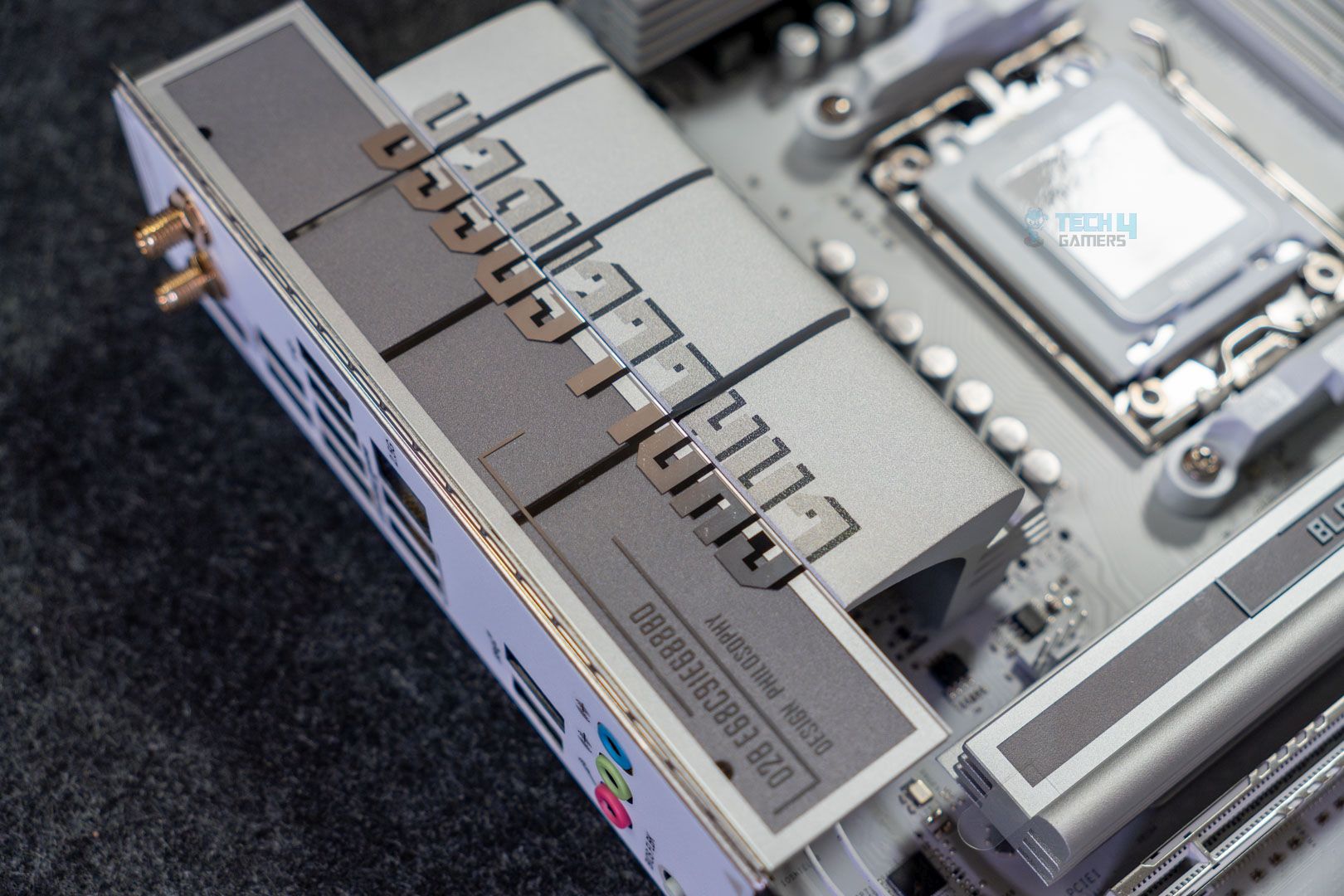
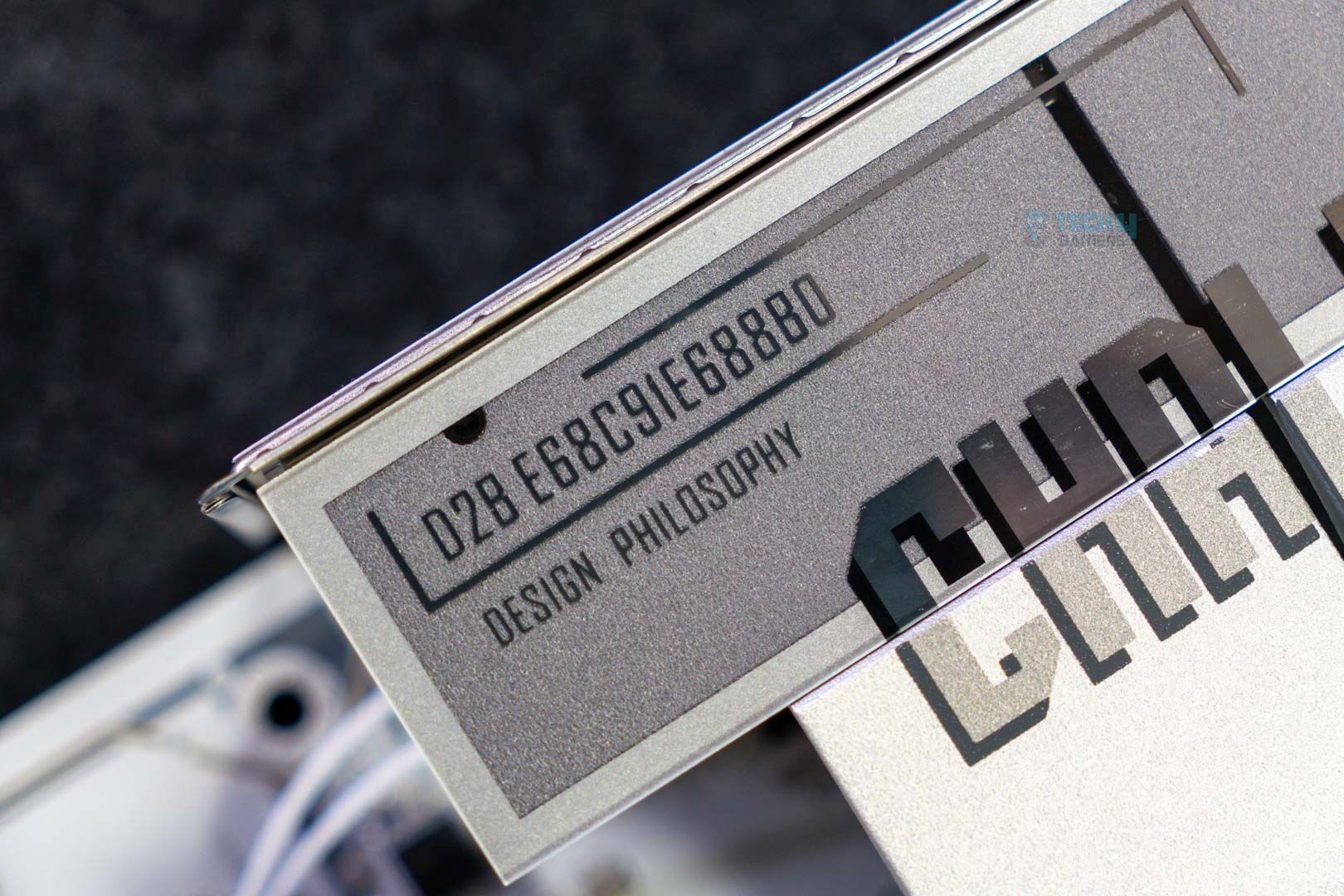
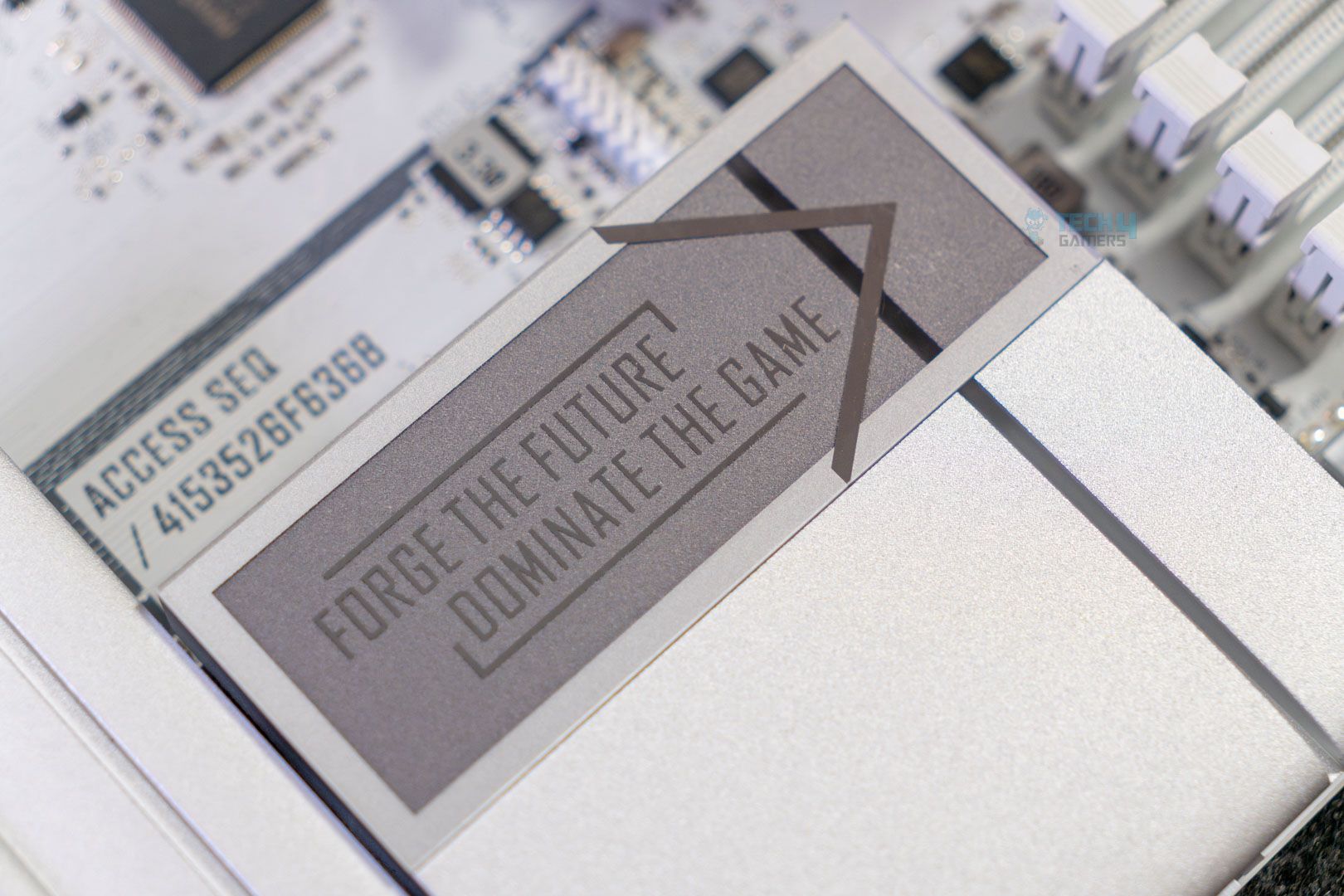
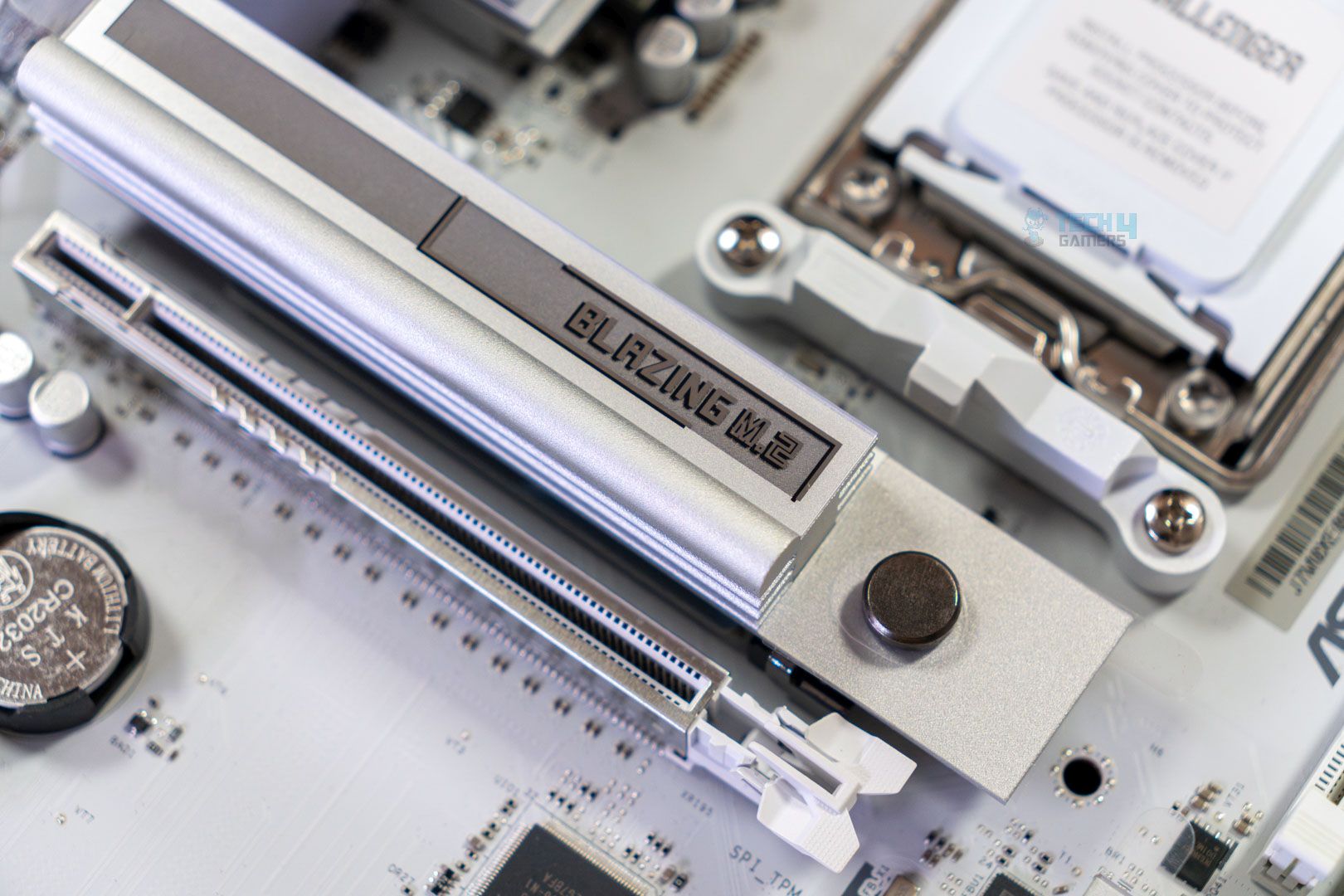
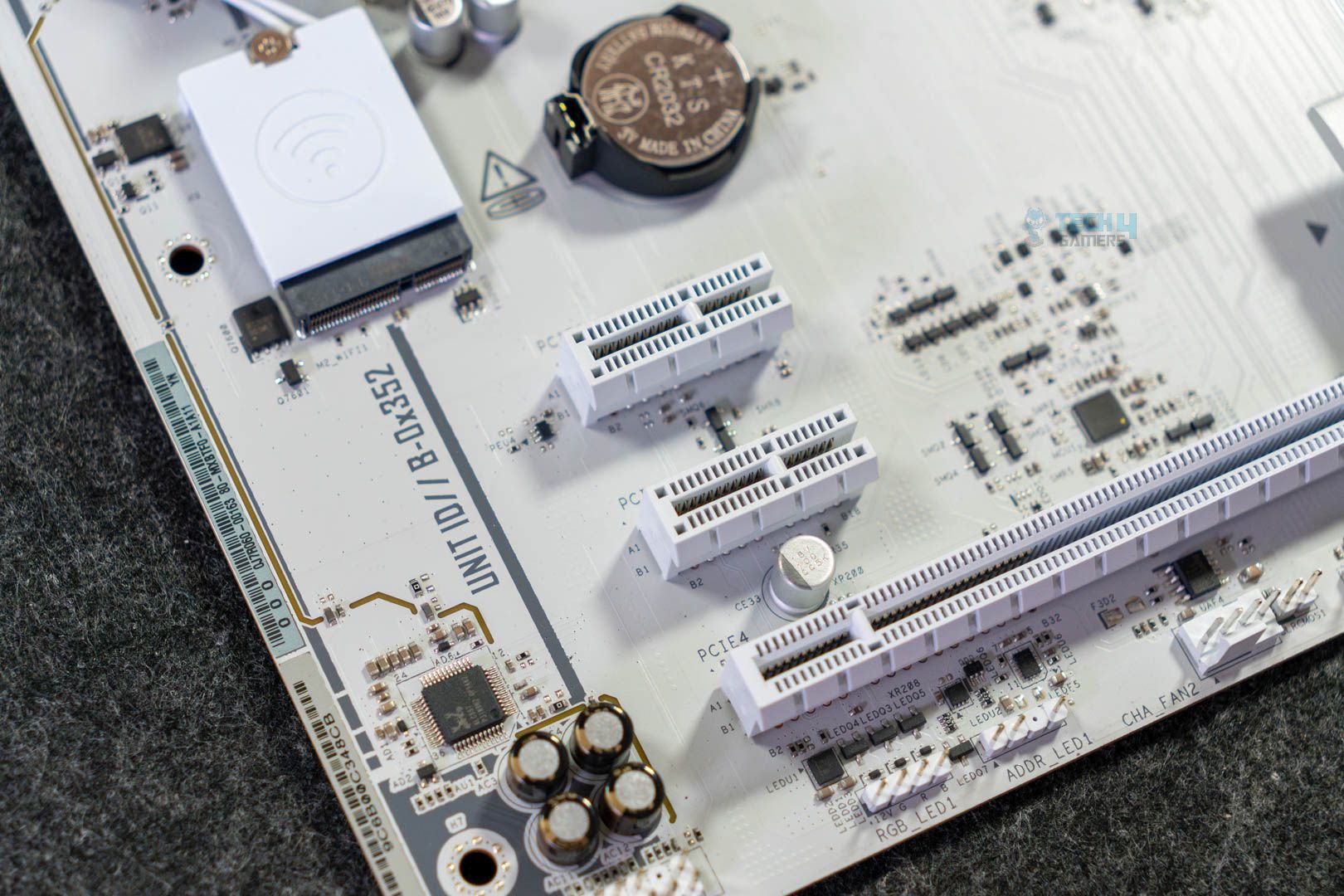
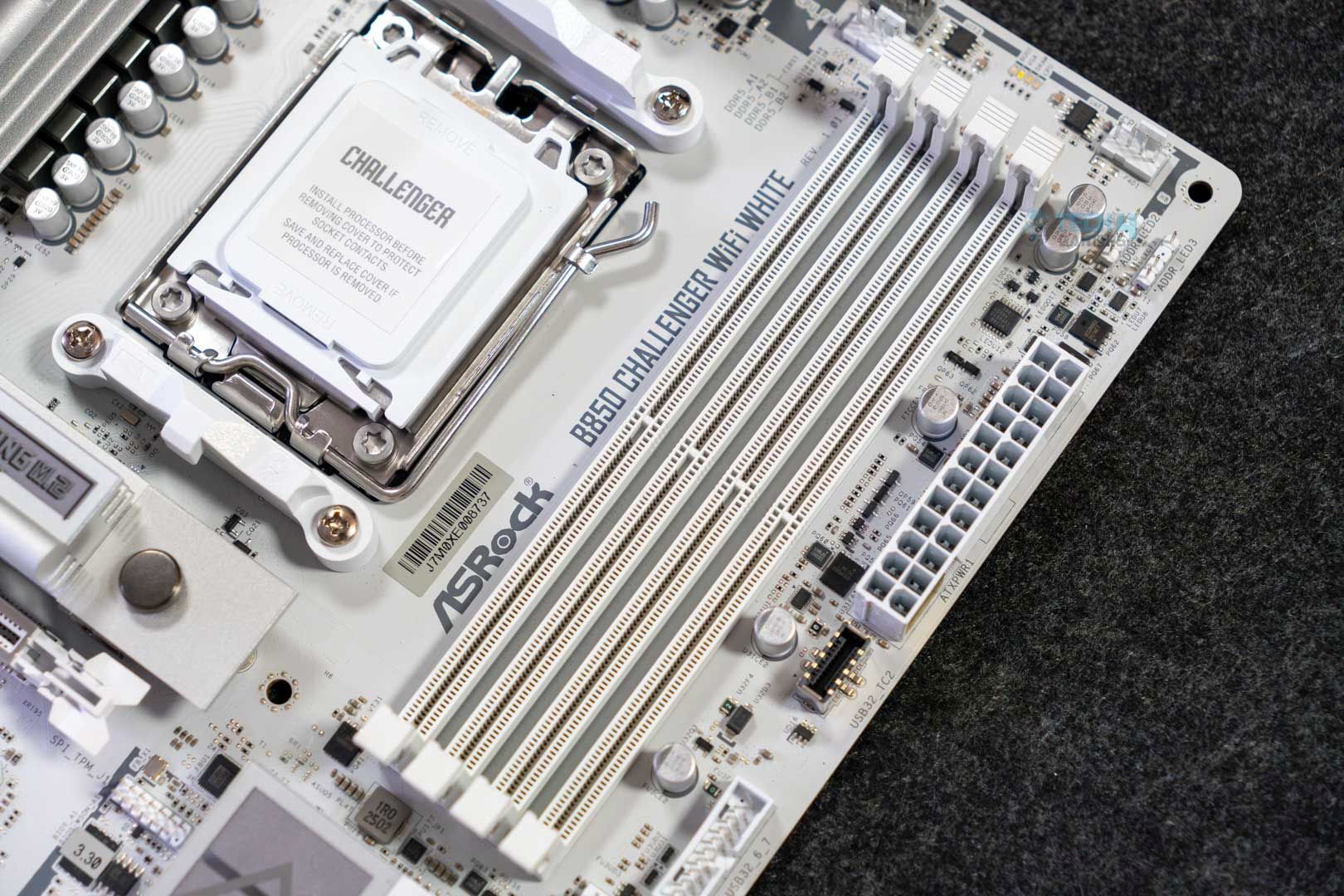
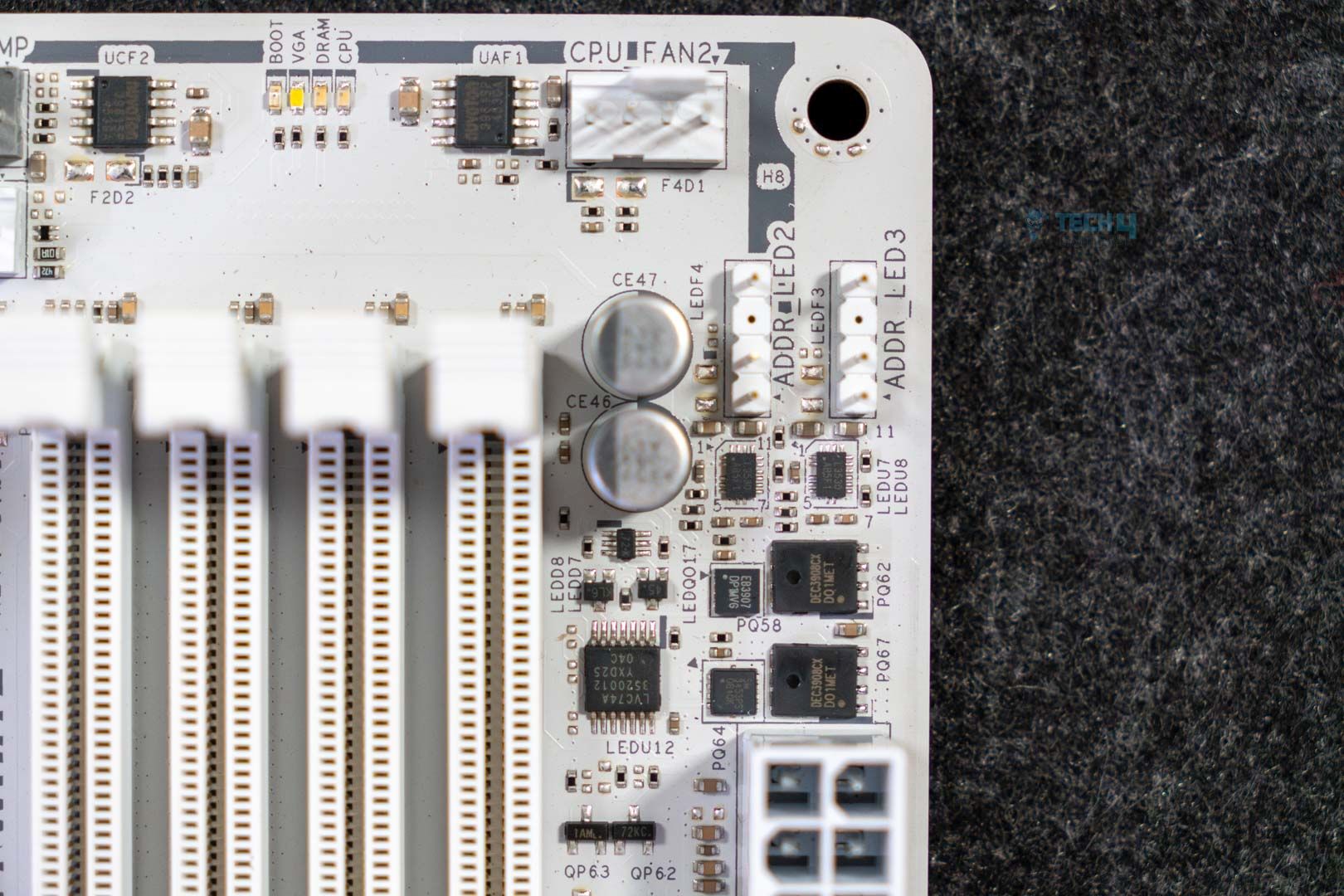
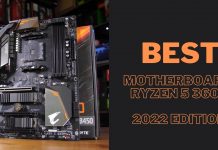
![BEST Motherboards For i9-13900K [Our Recommendations] Best Motherboard For Core i9-13900K](https://tech4gamers.com/wp-content/uploads/2022/11/Best-Motherboards-For-Core-i9-13900K-218x150.jpg)
